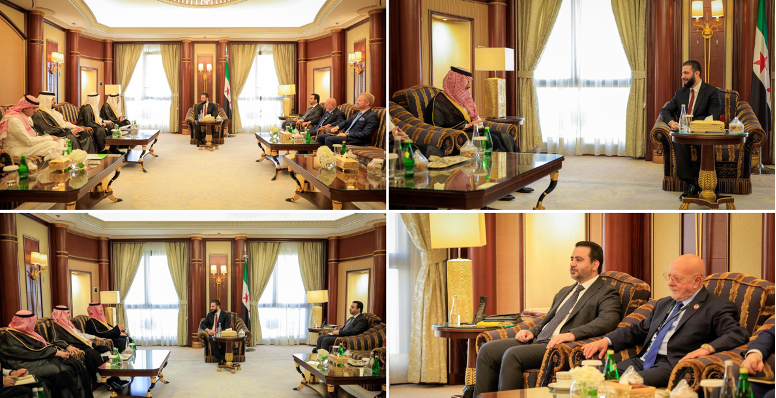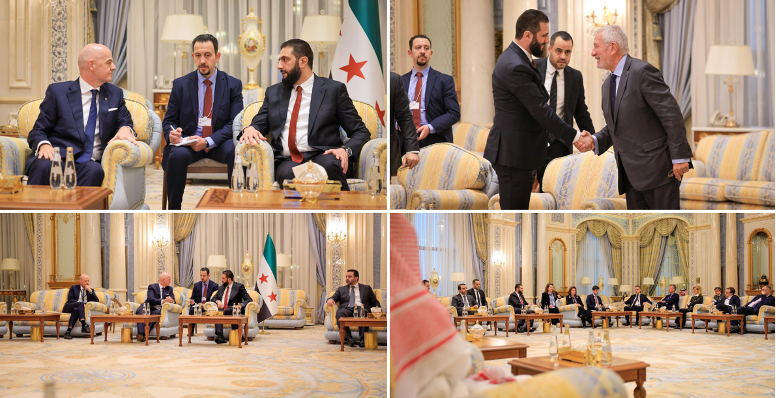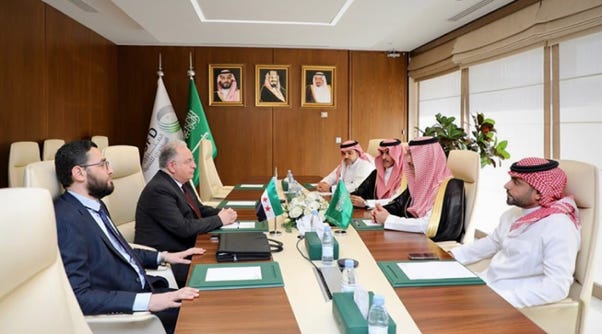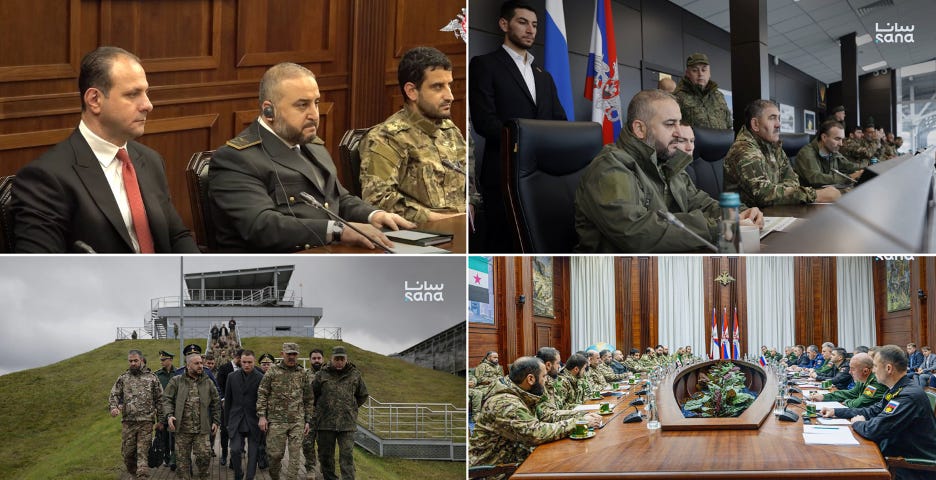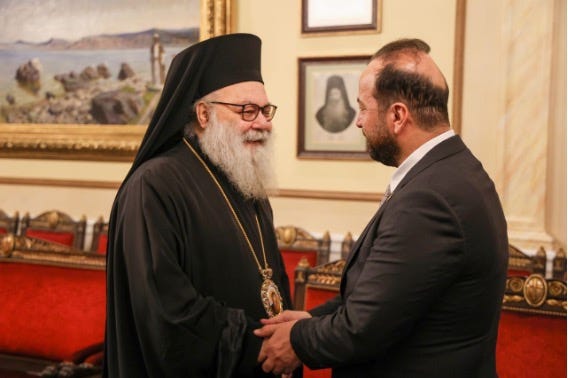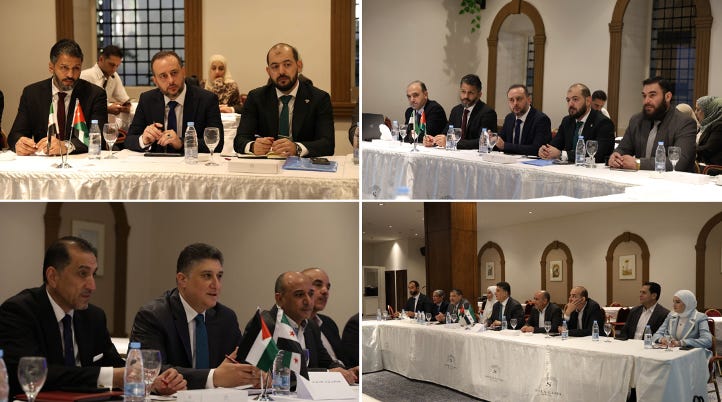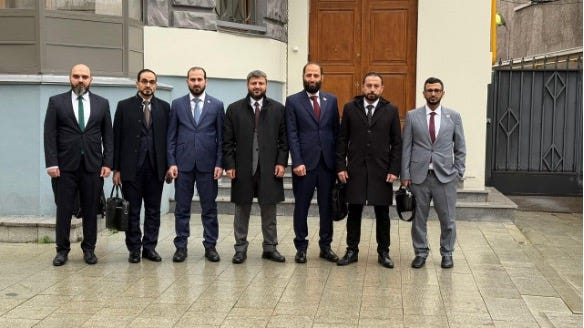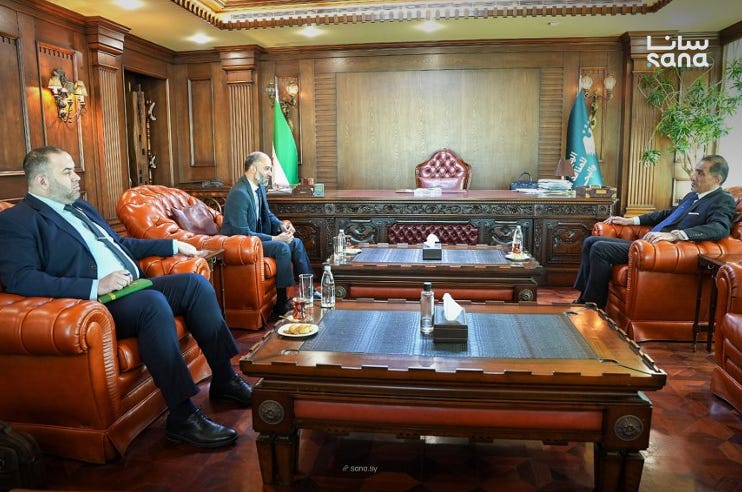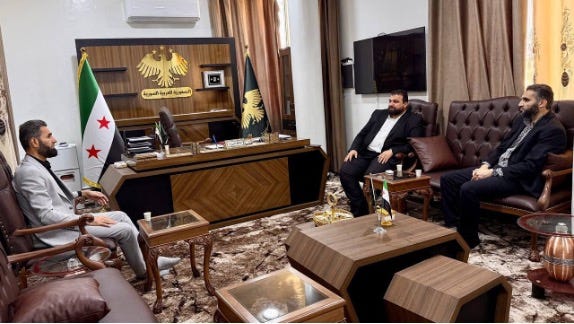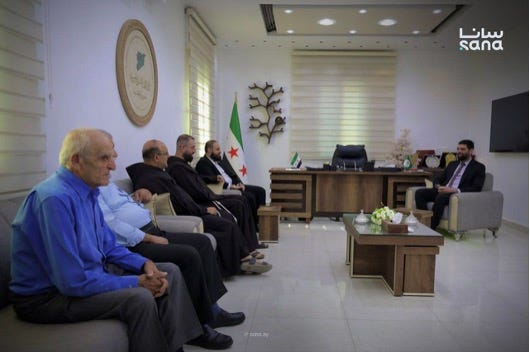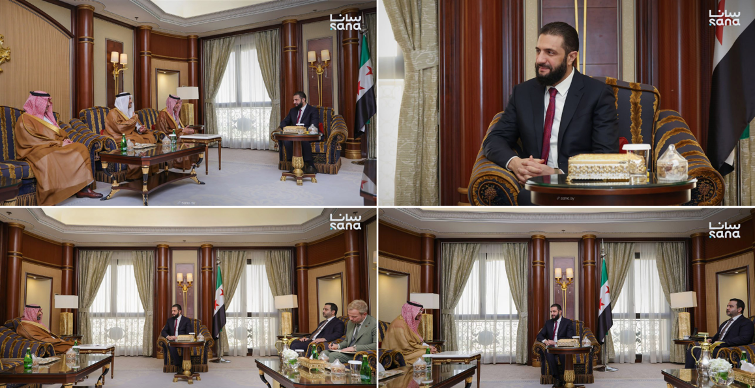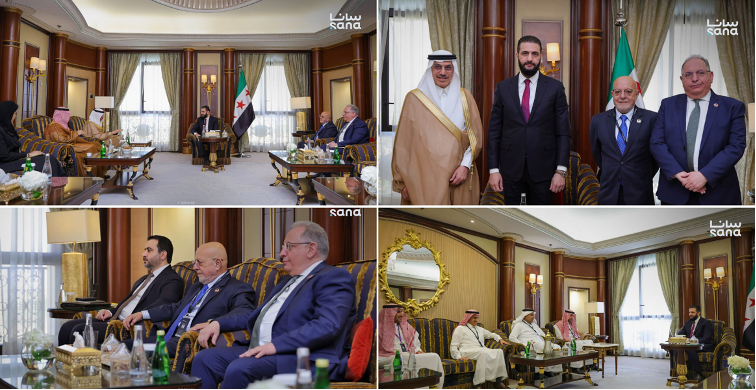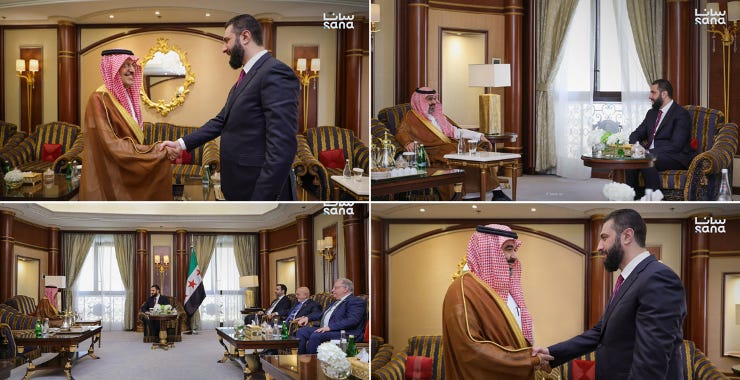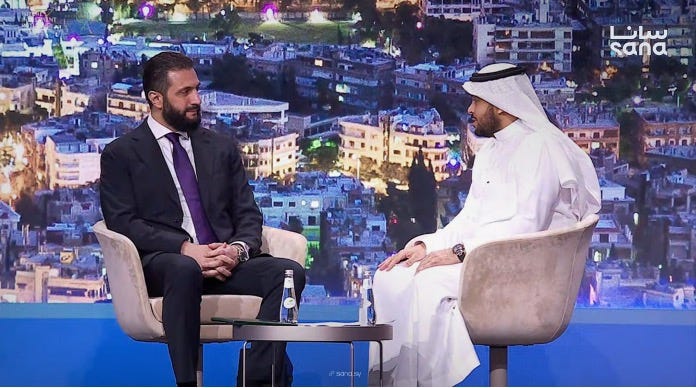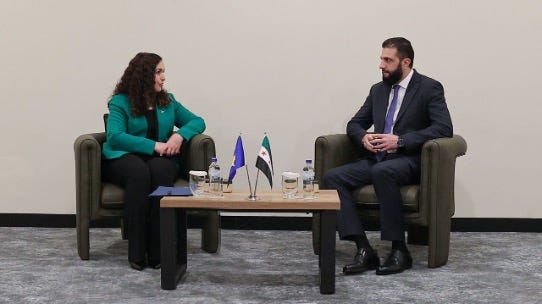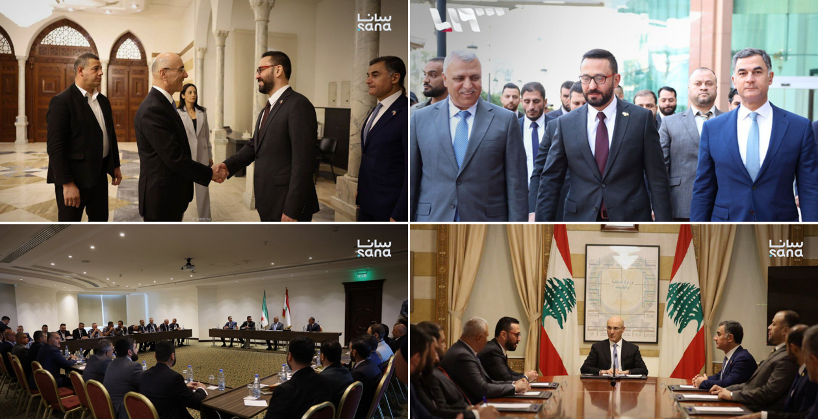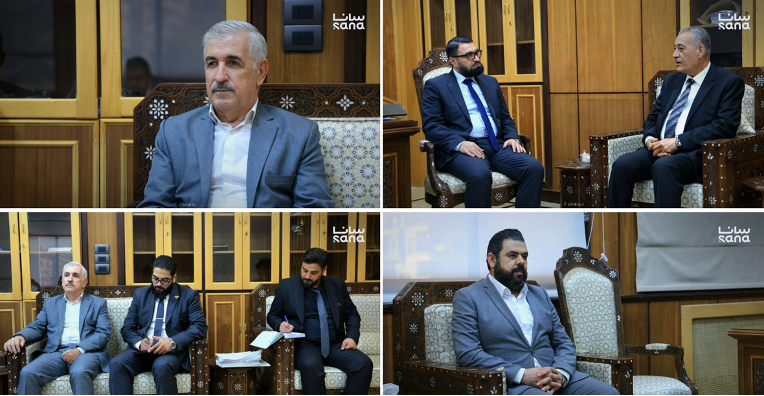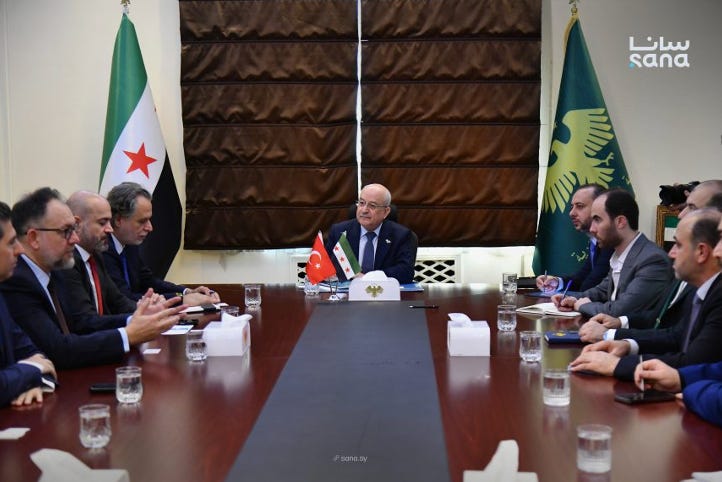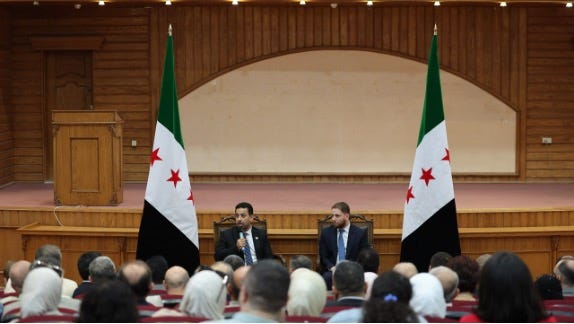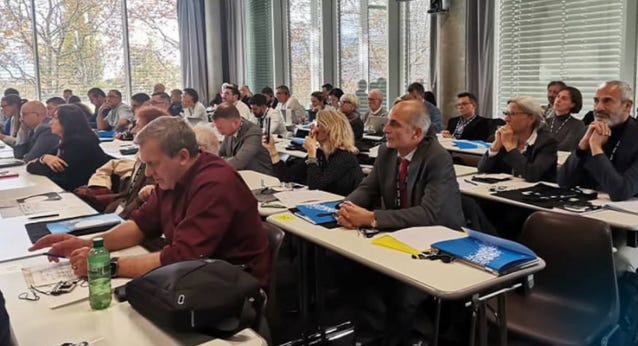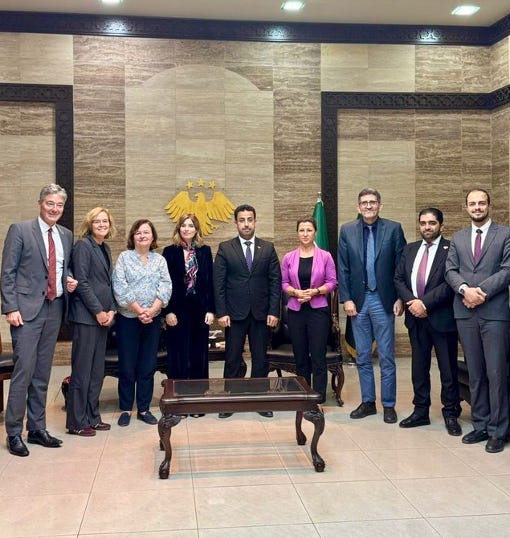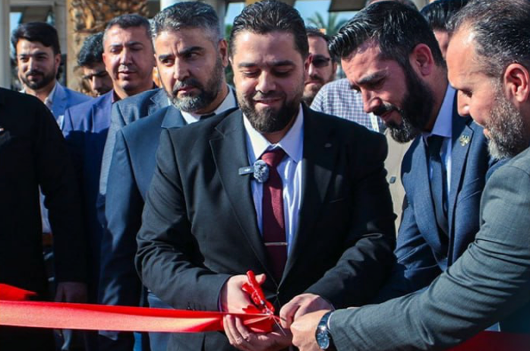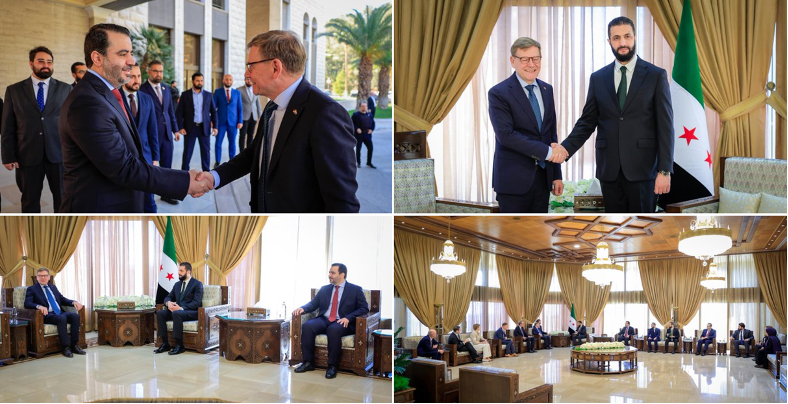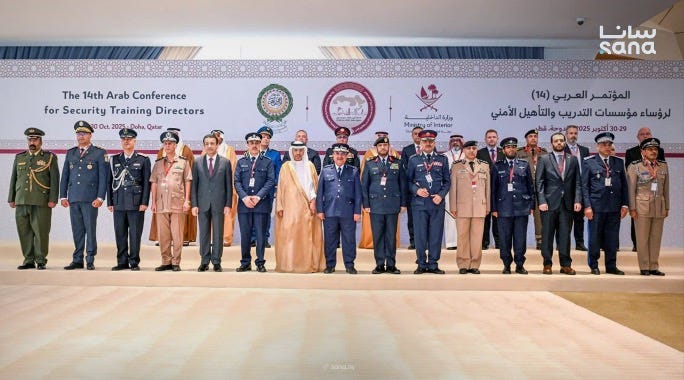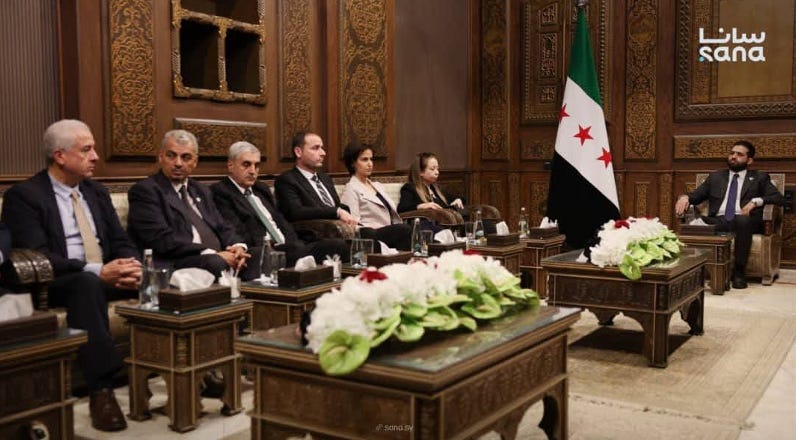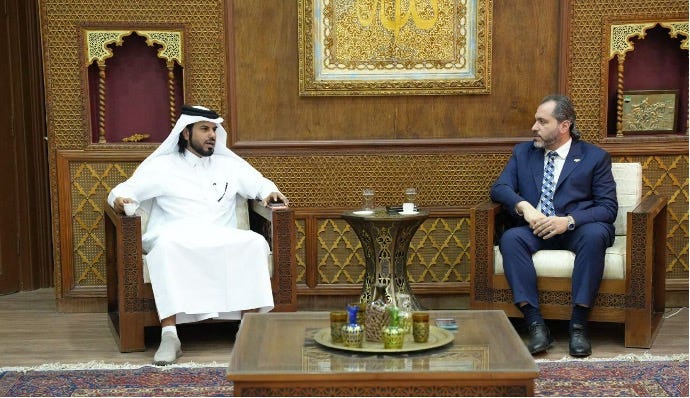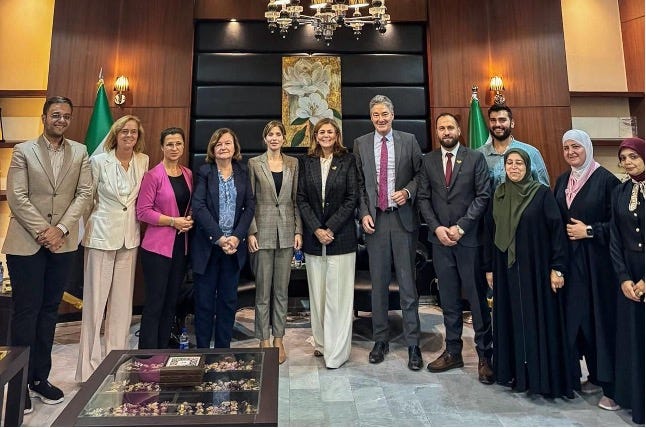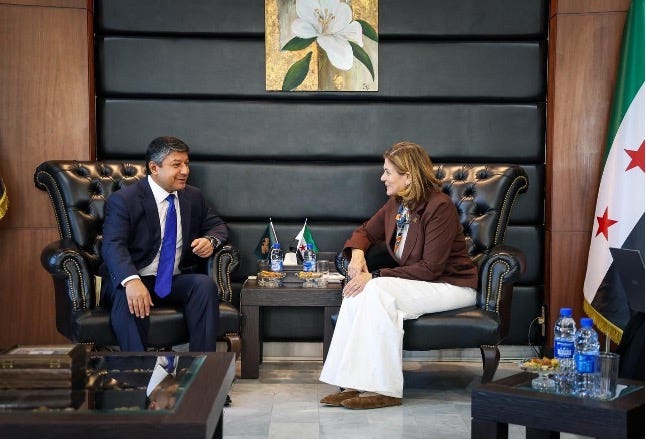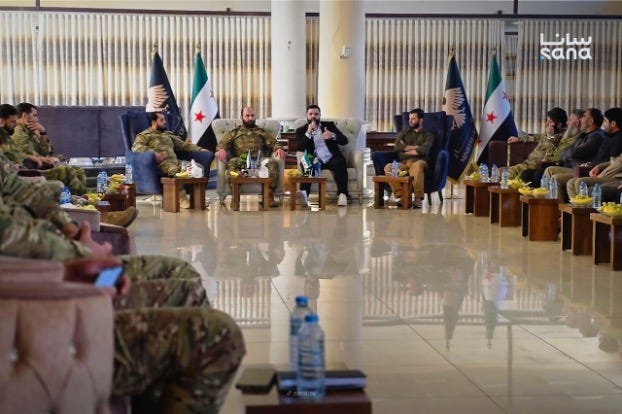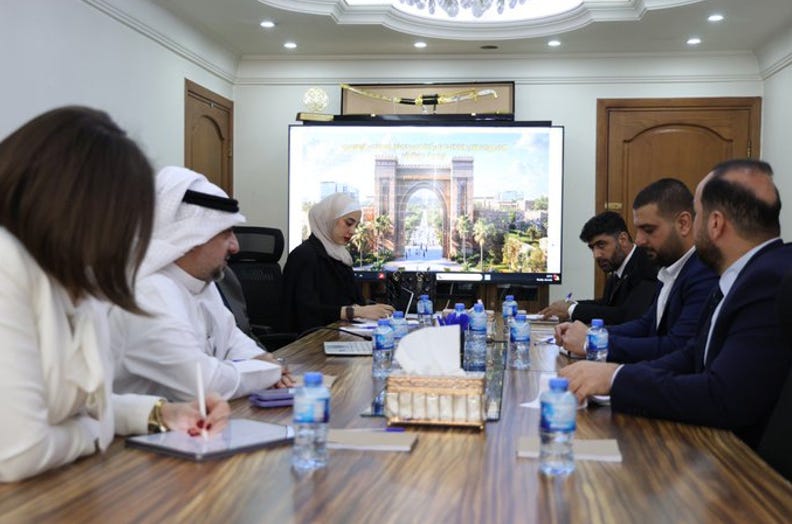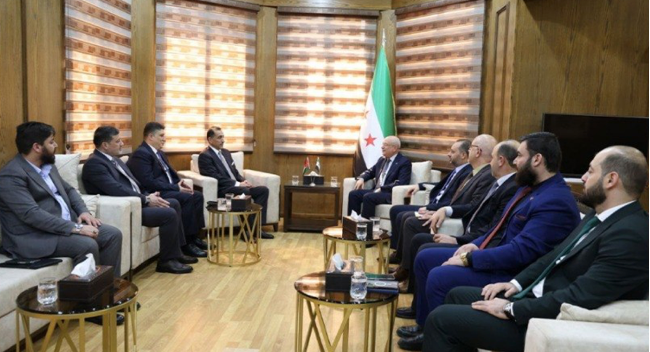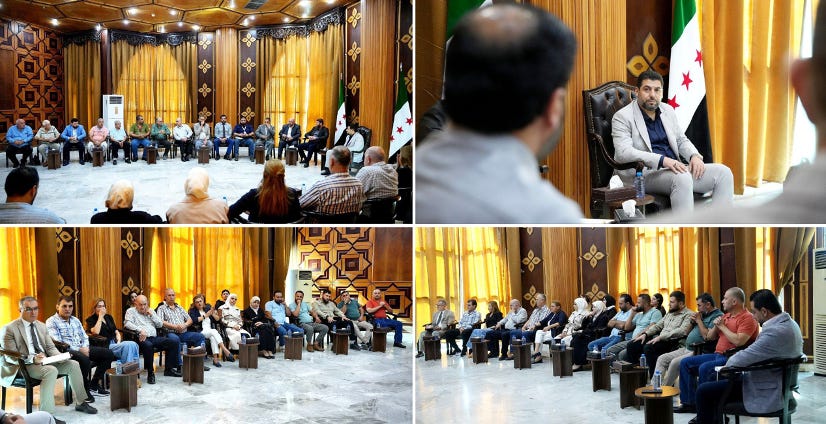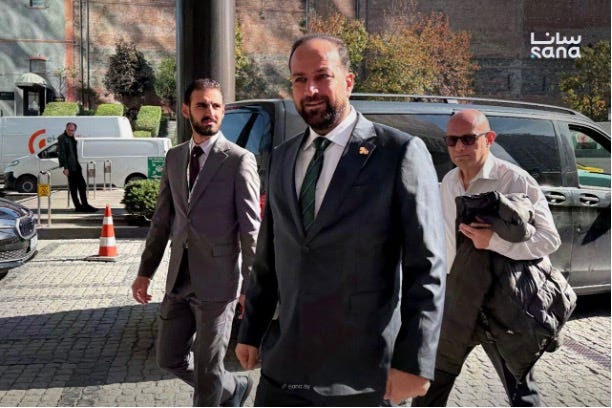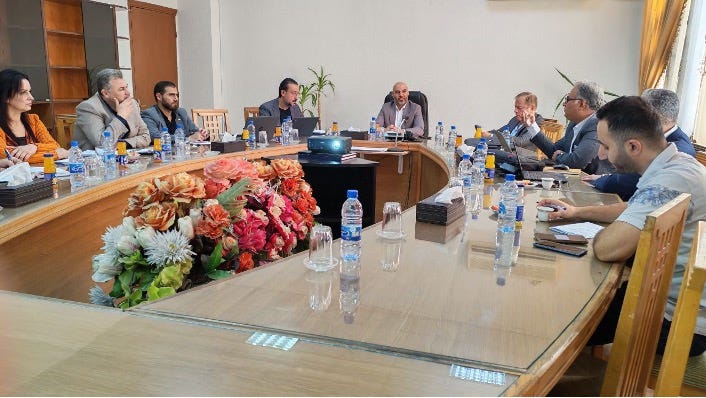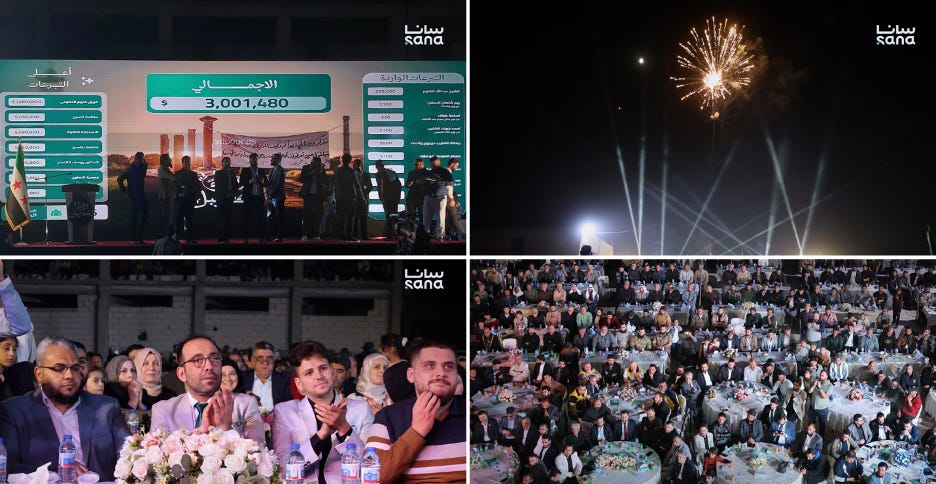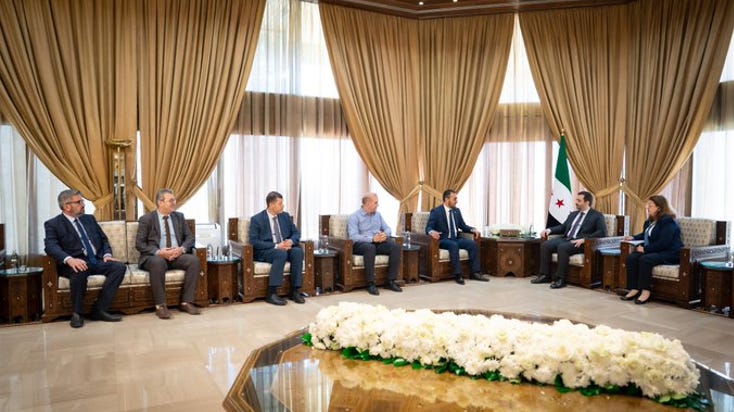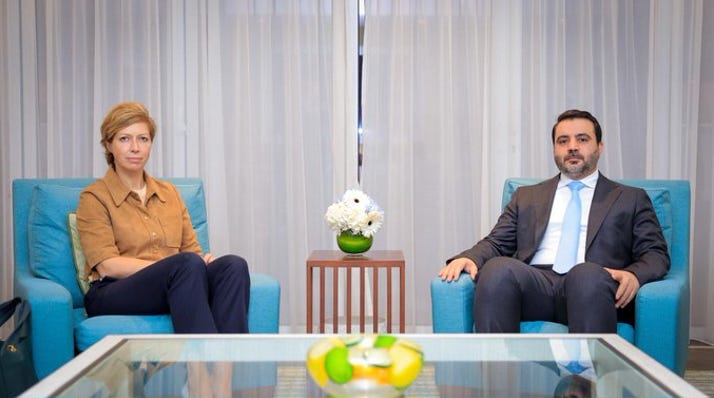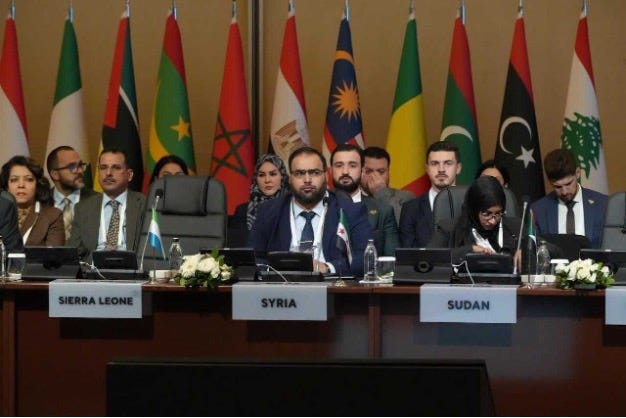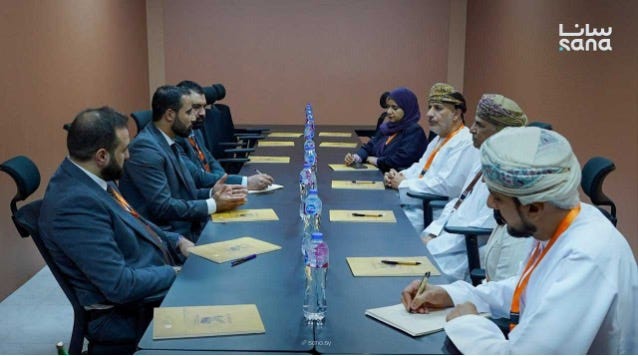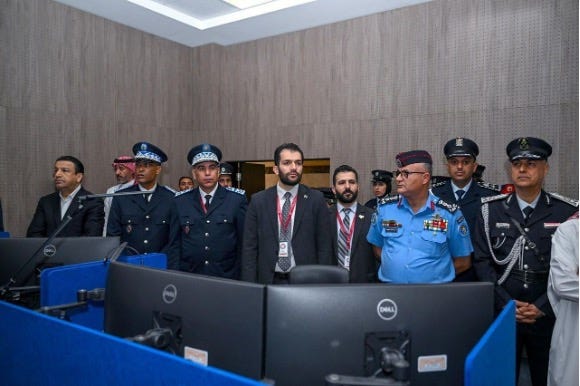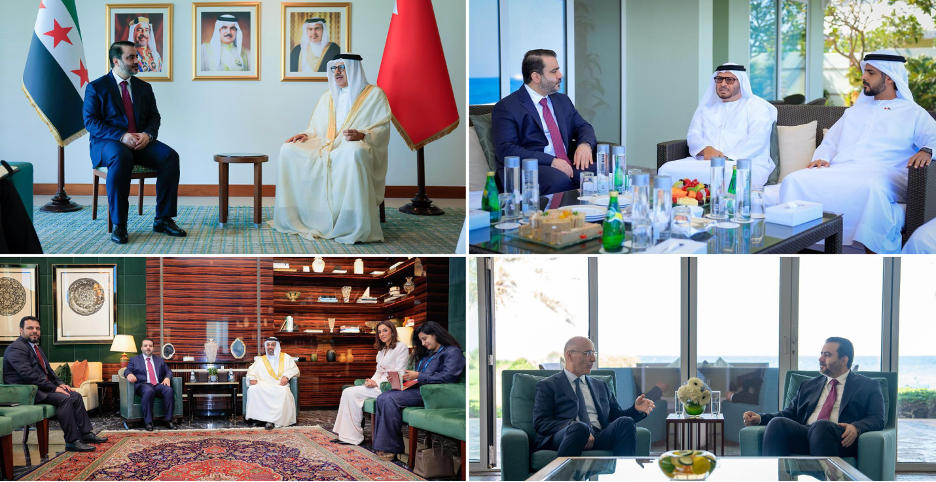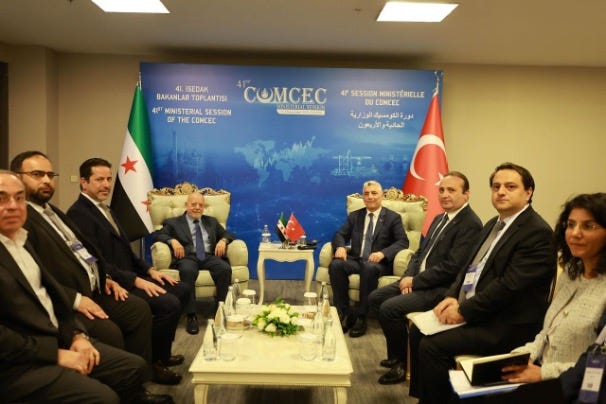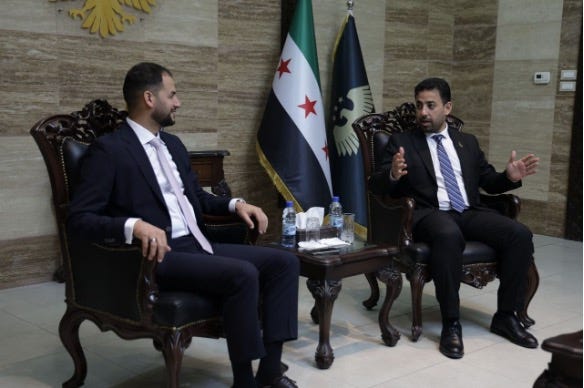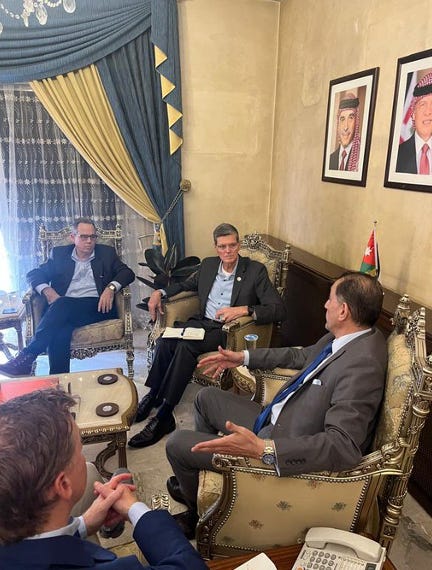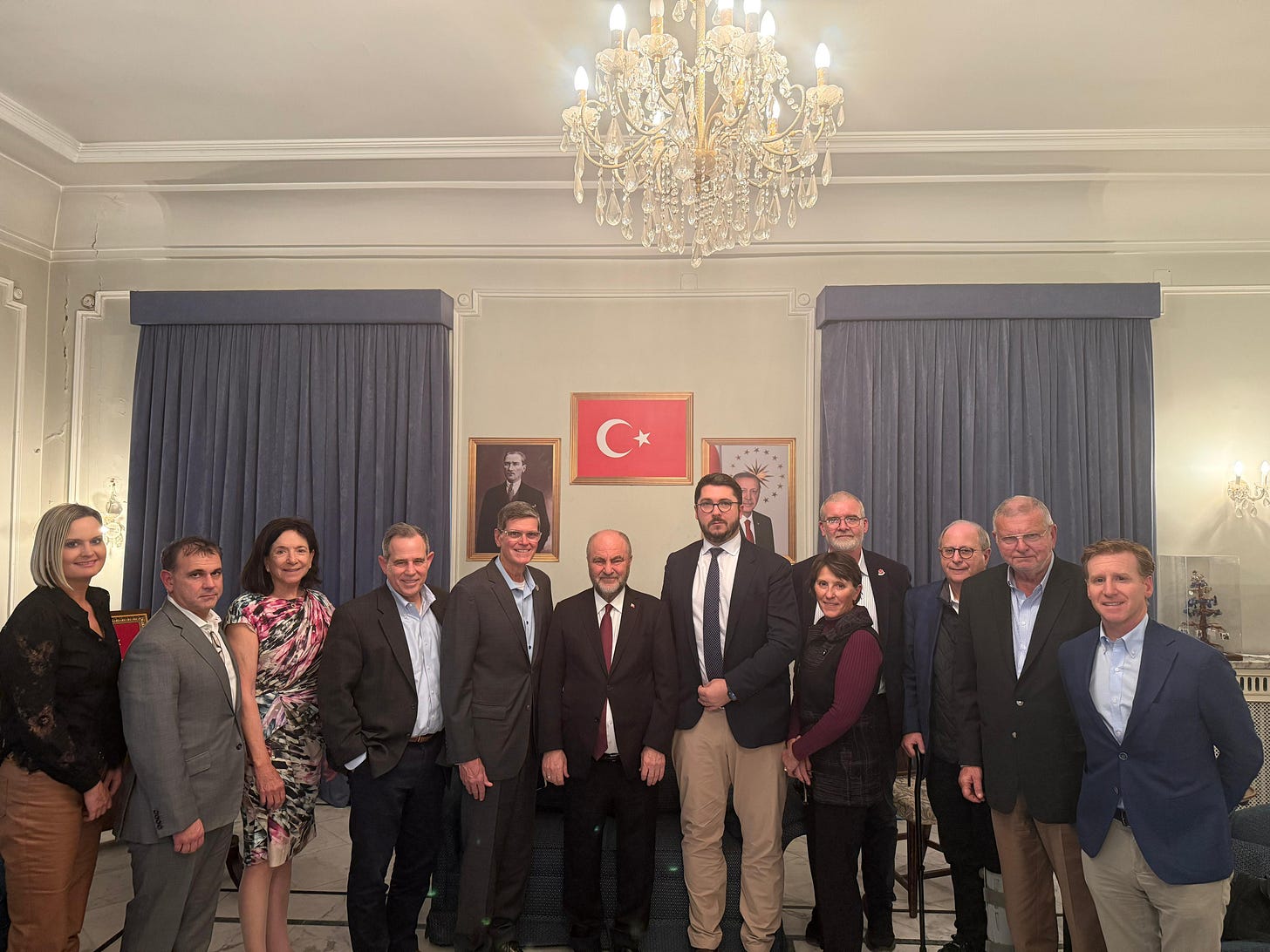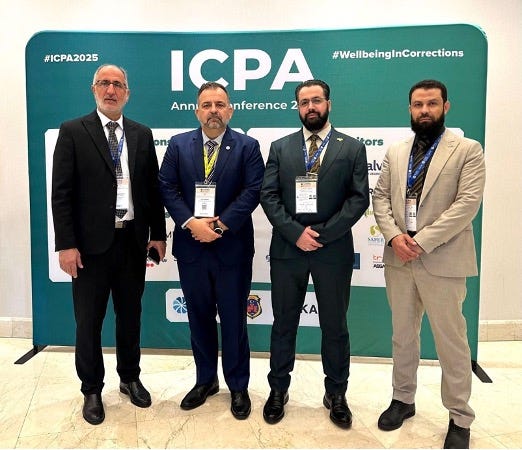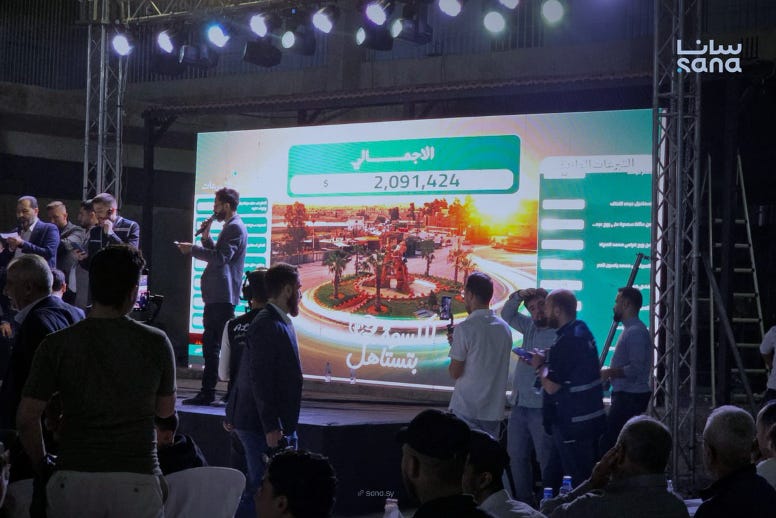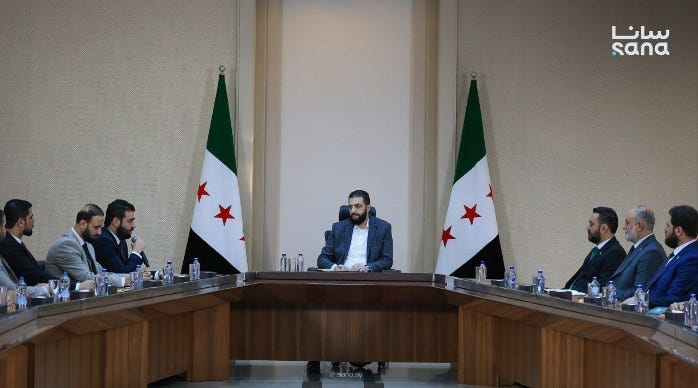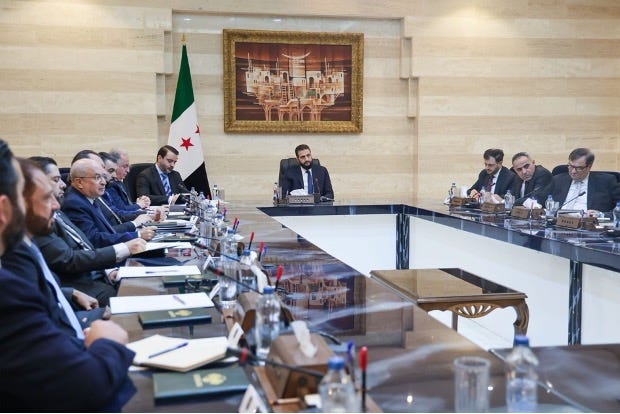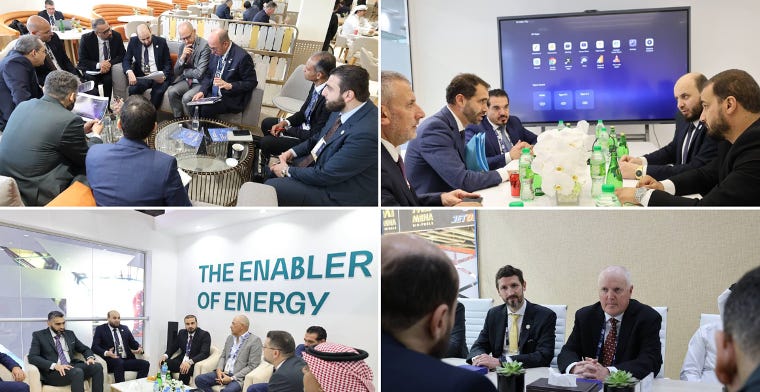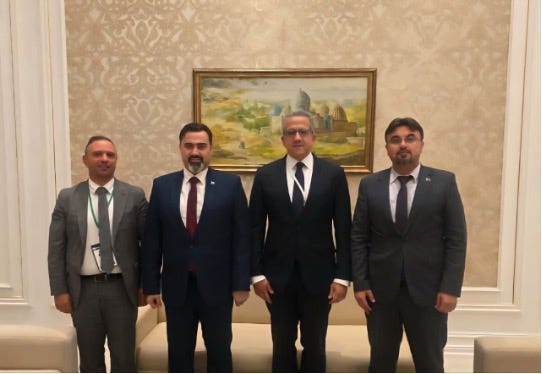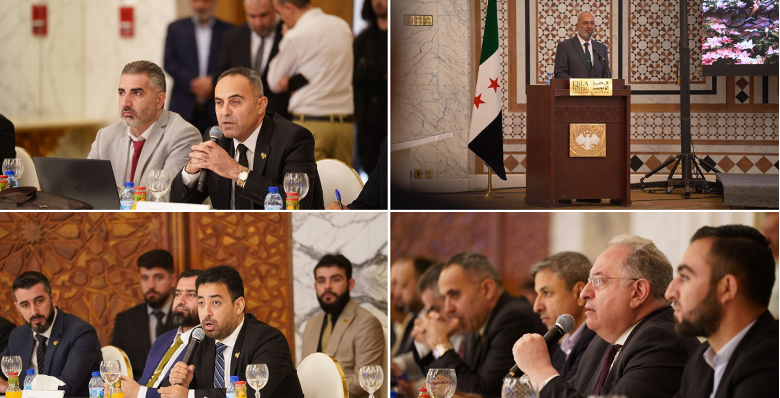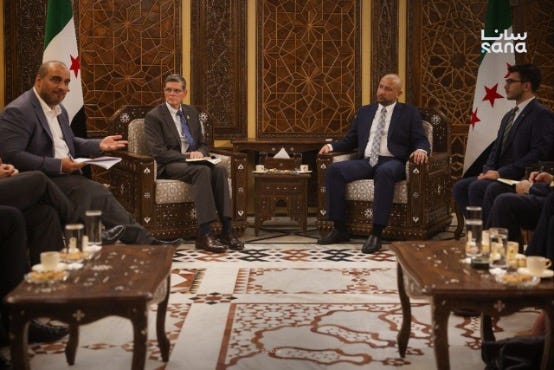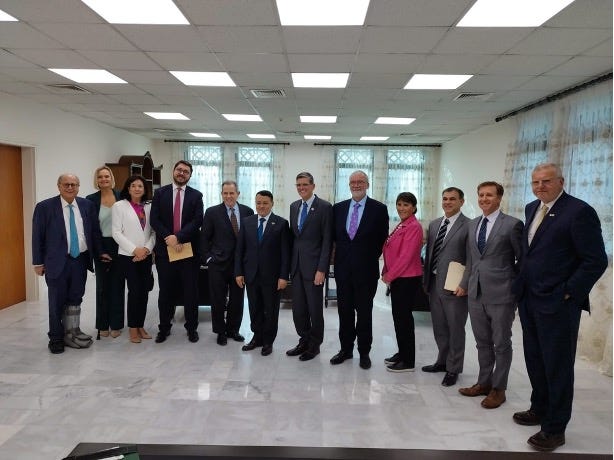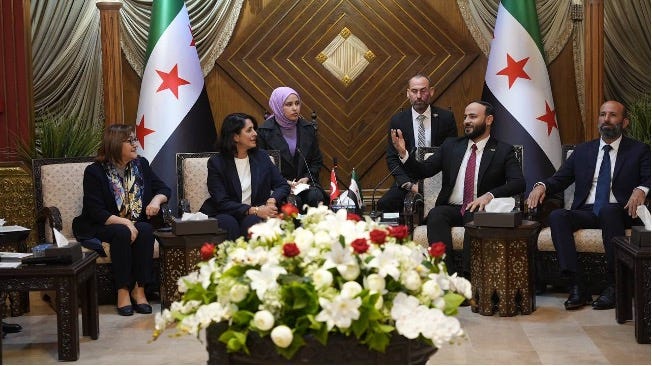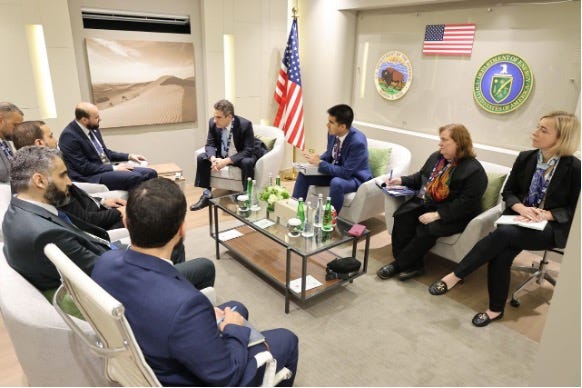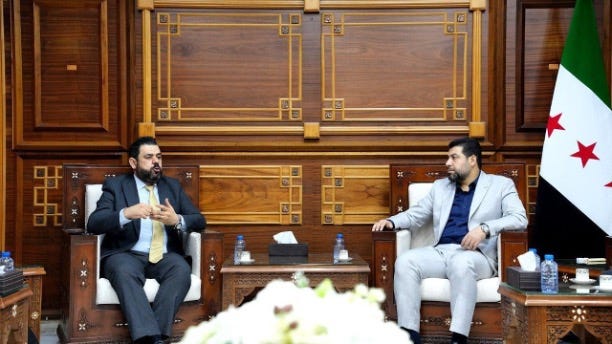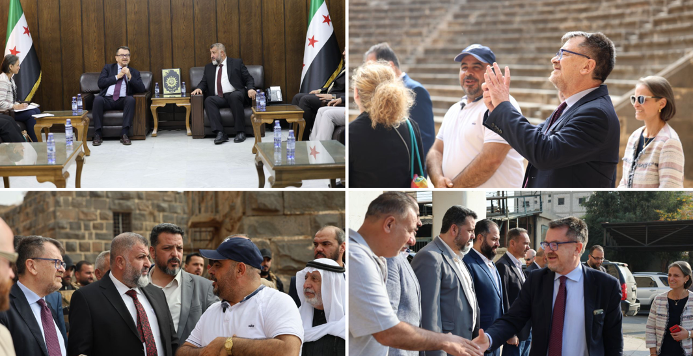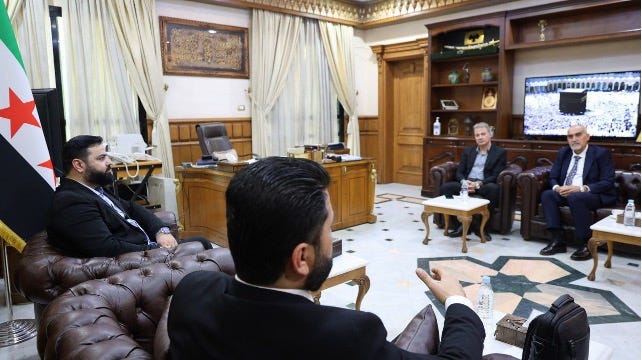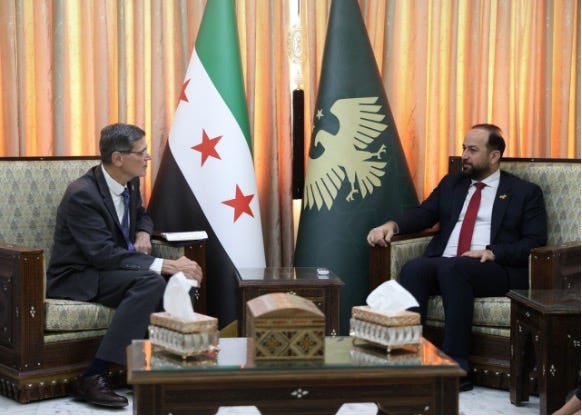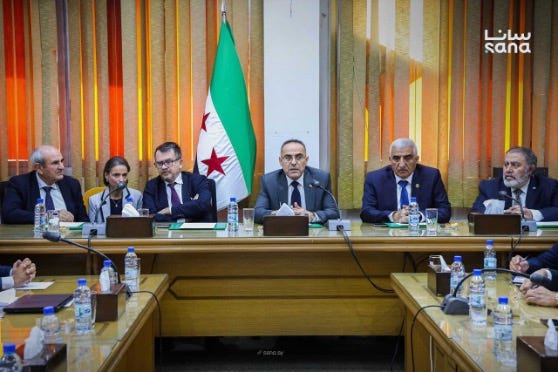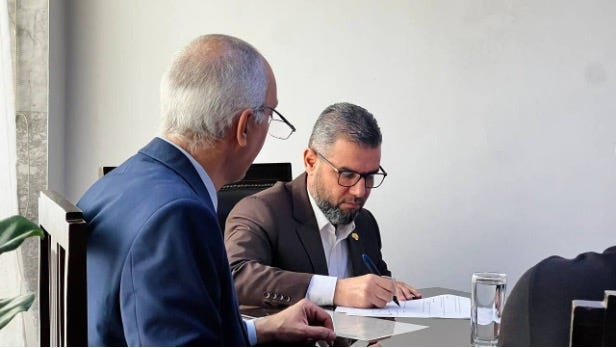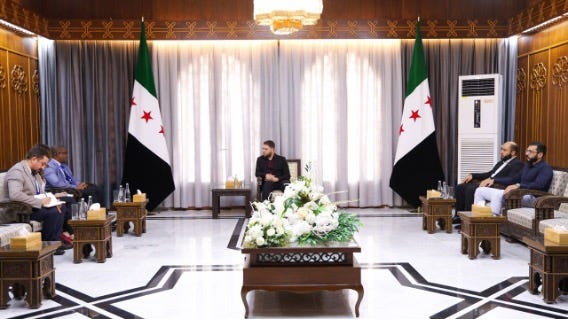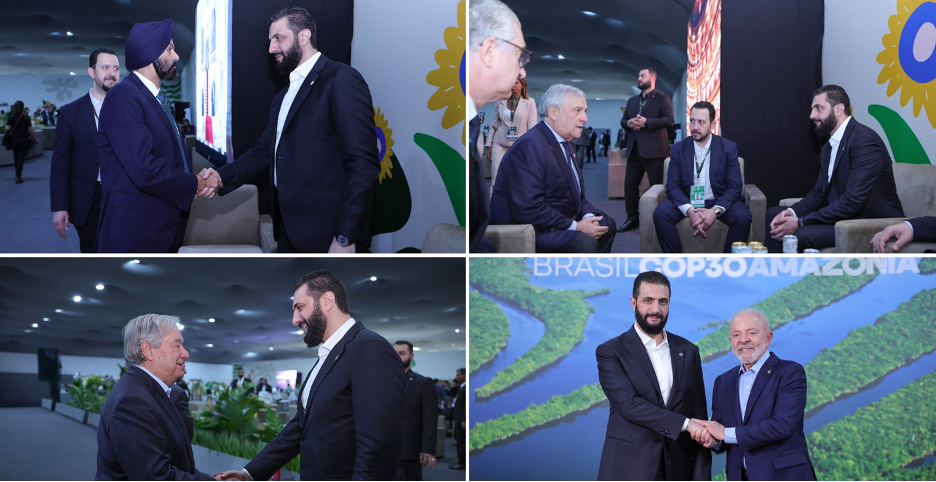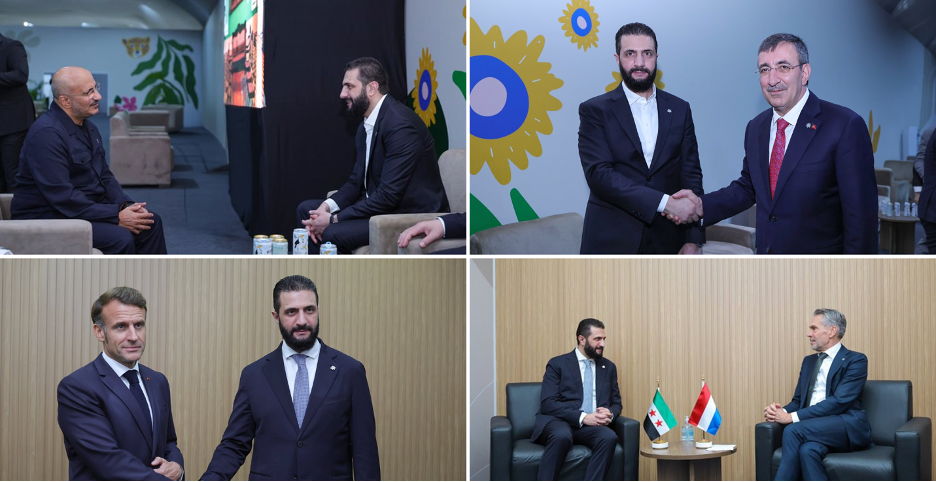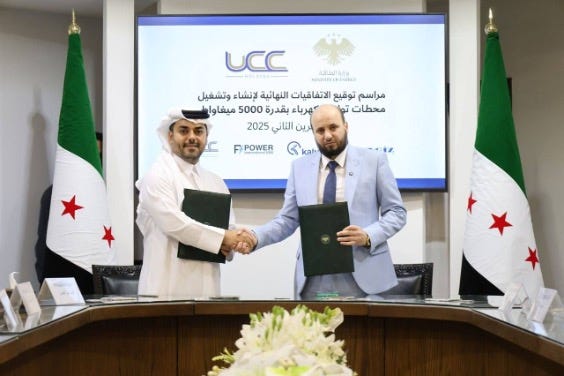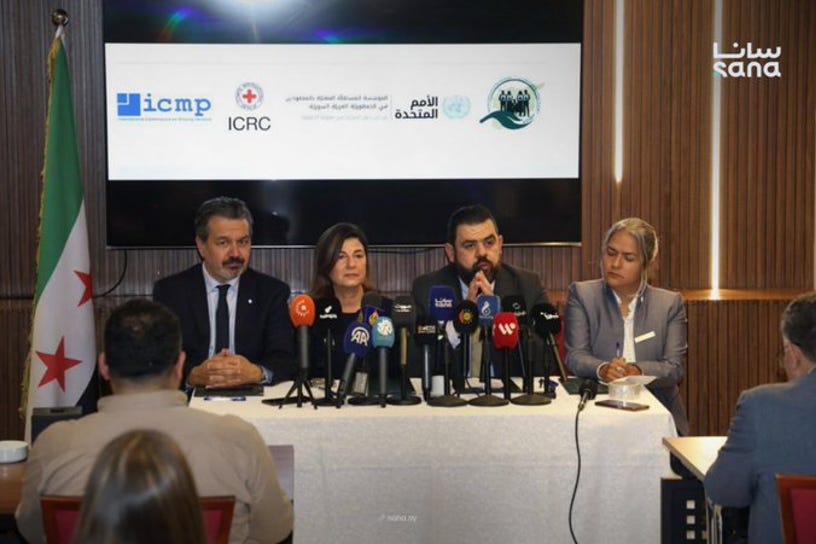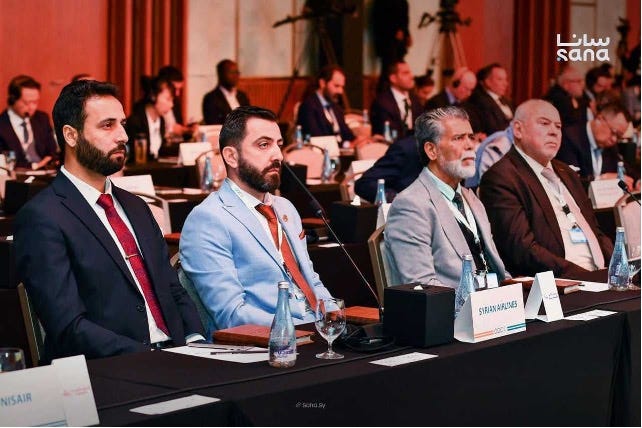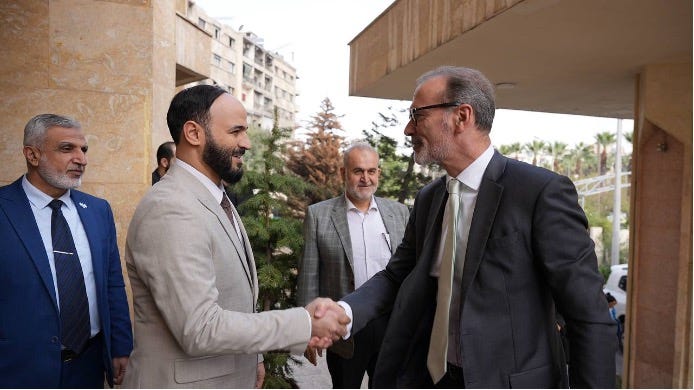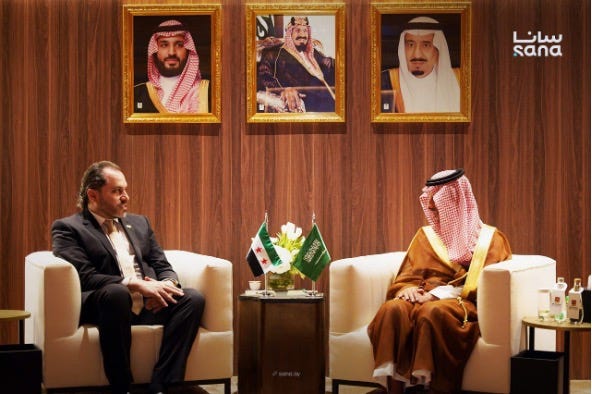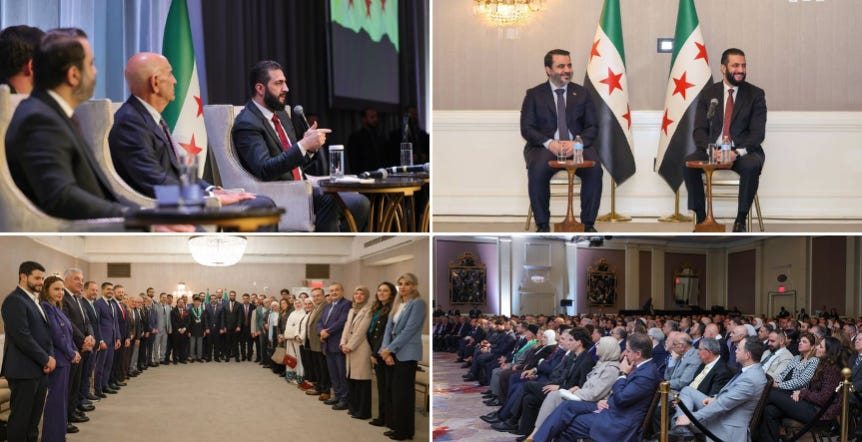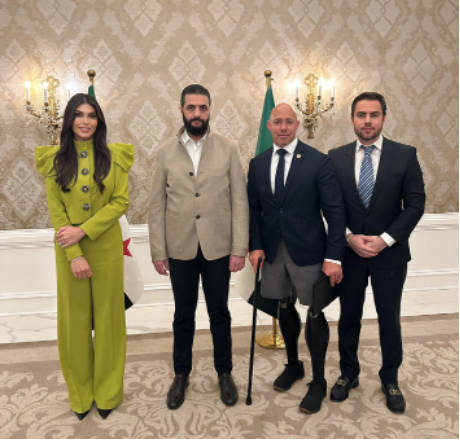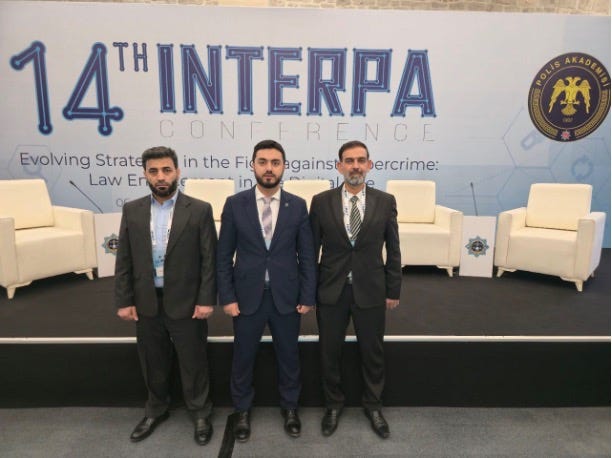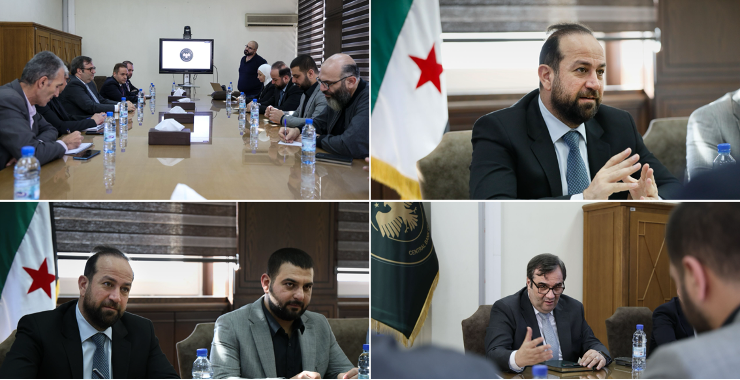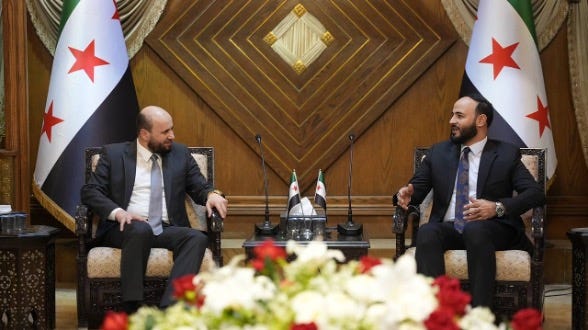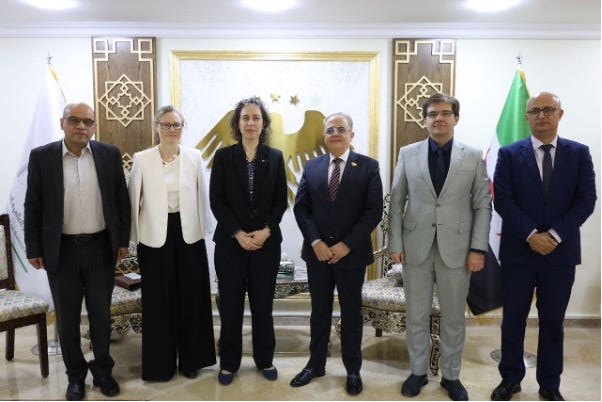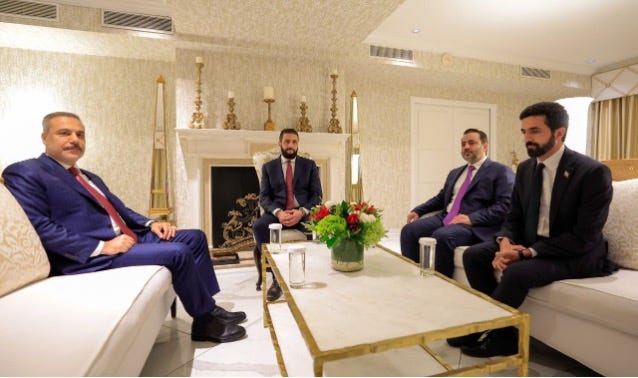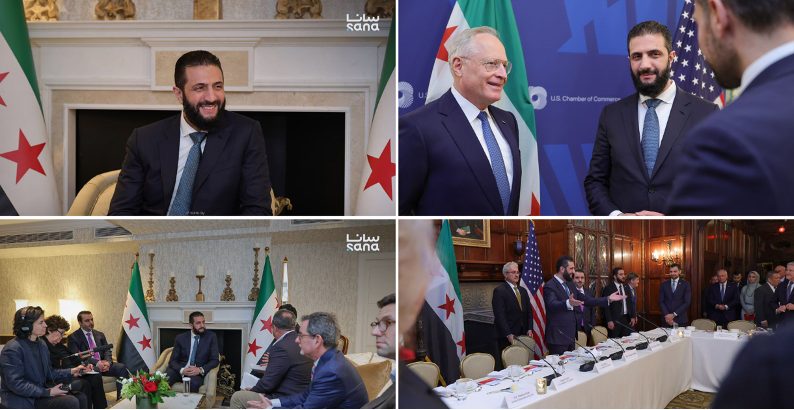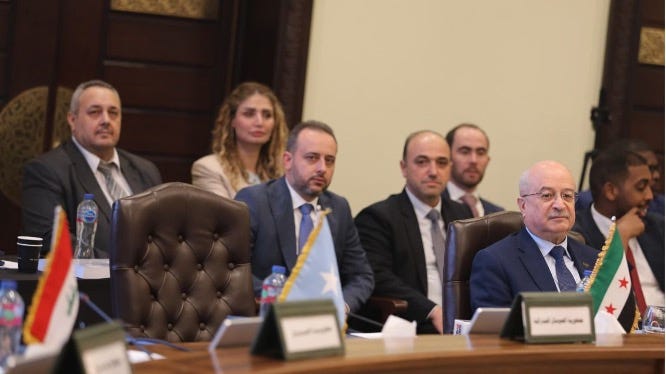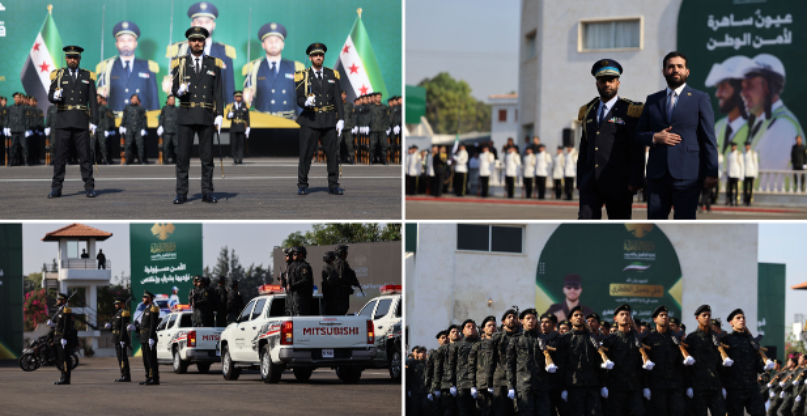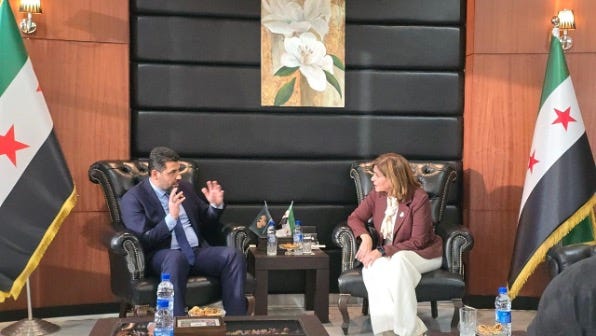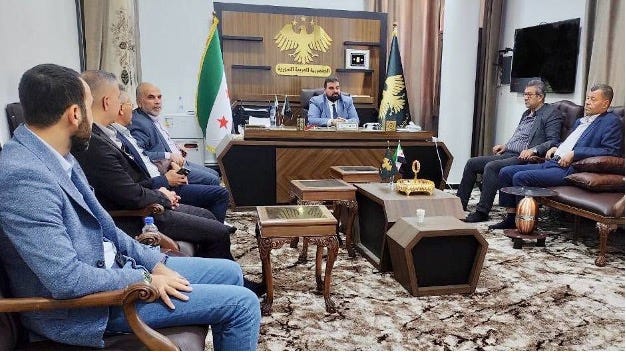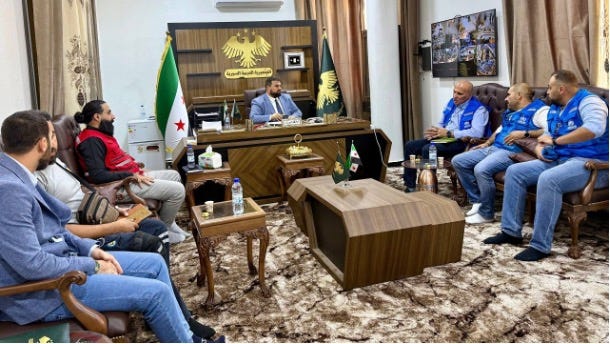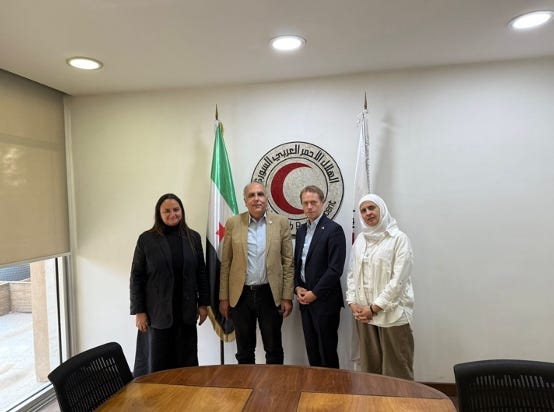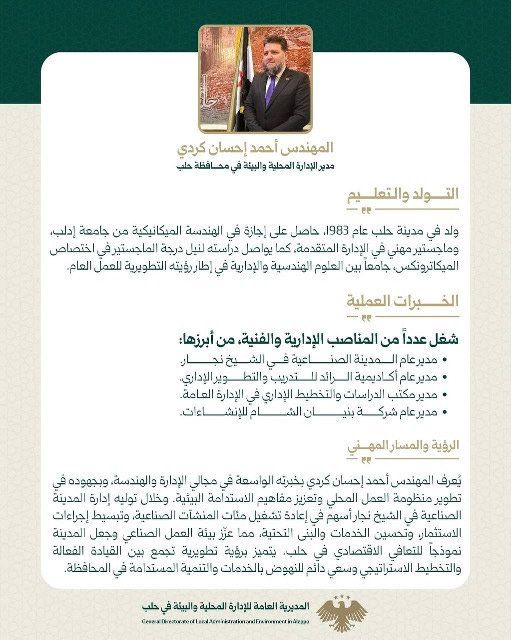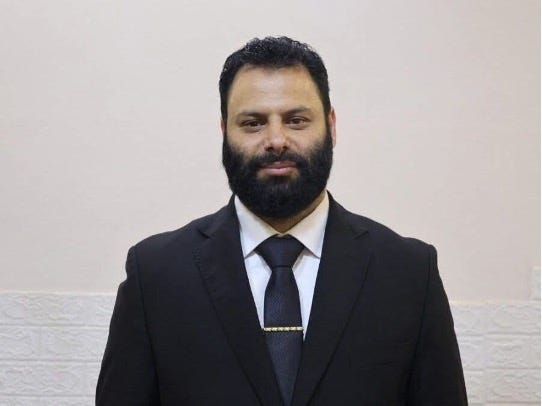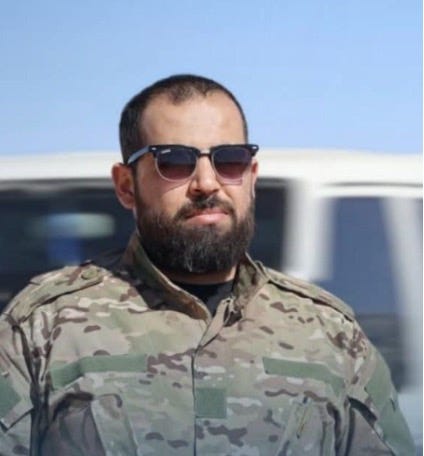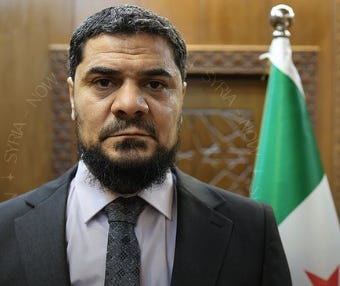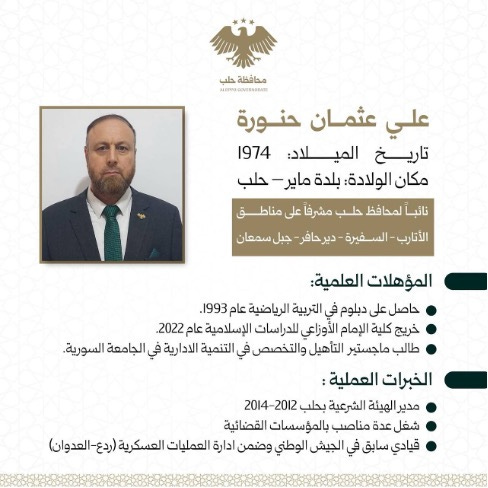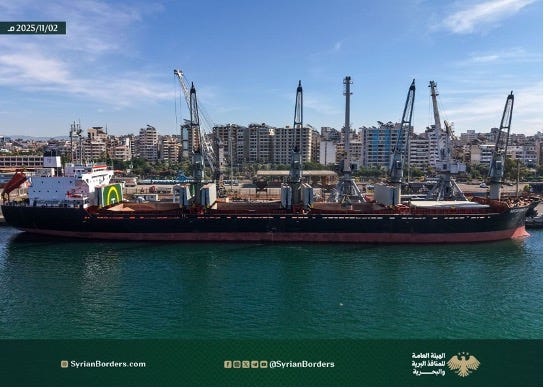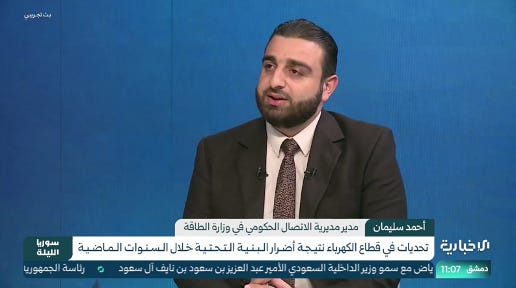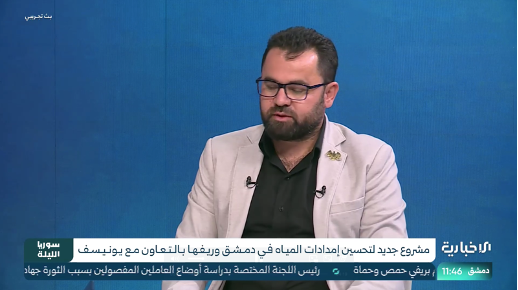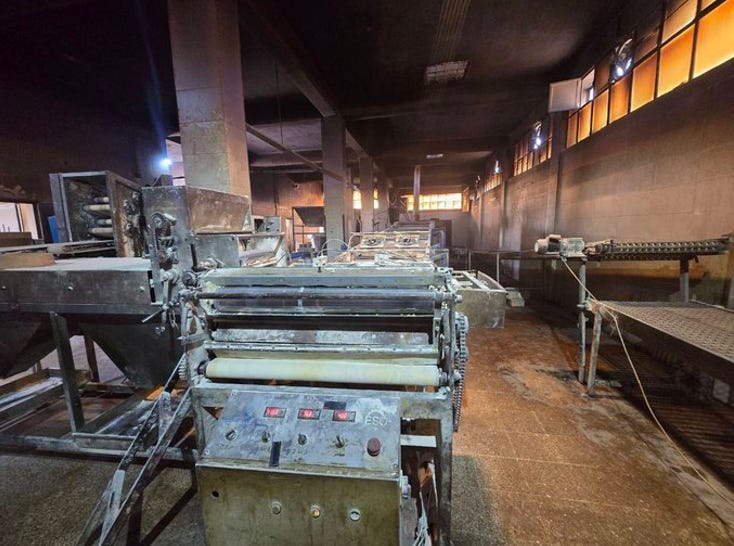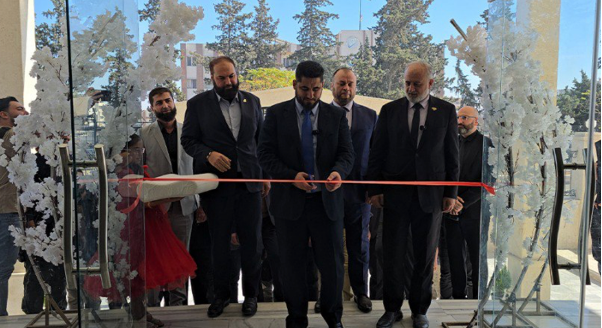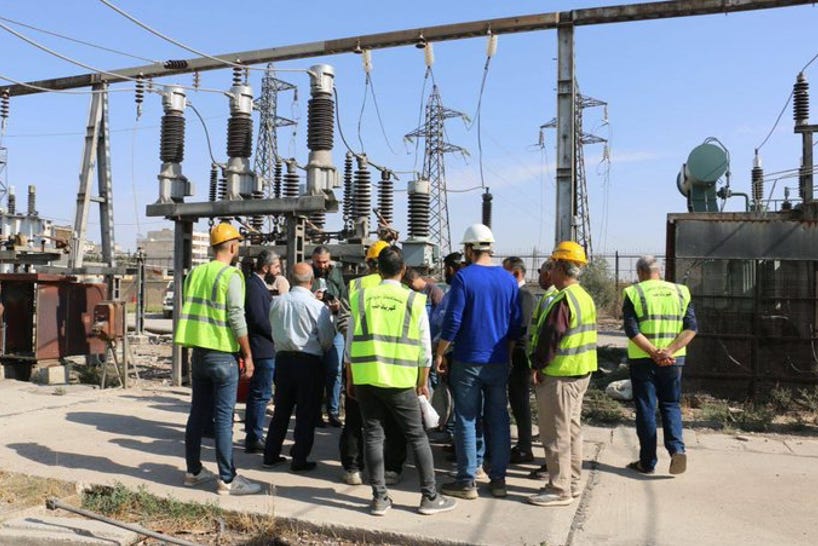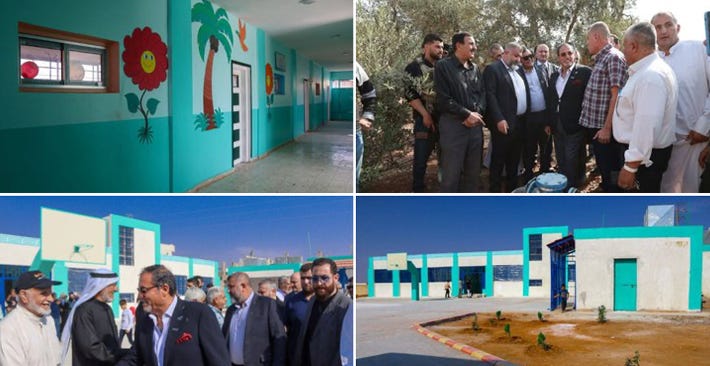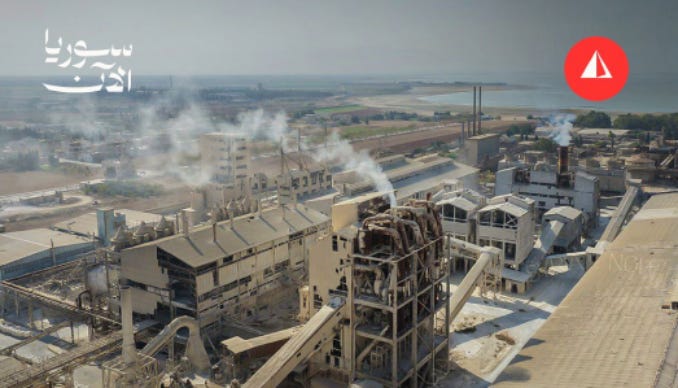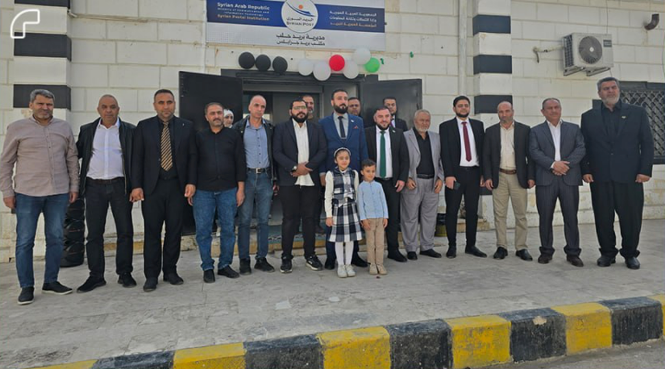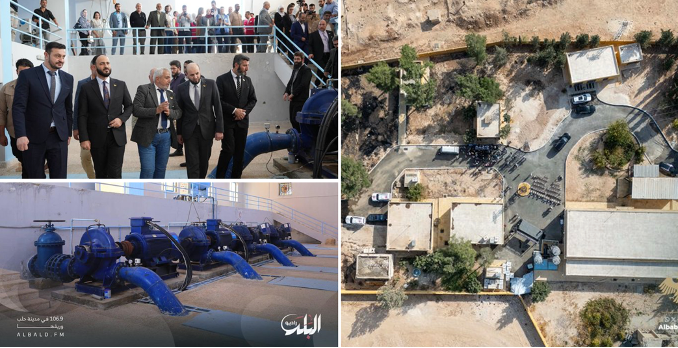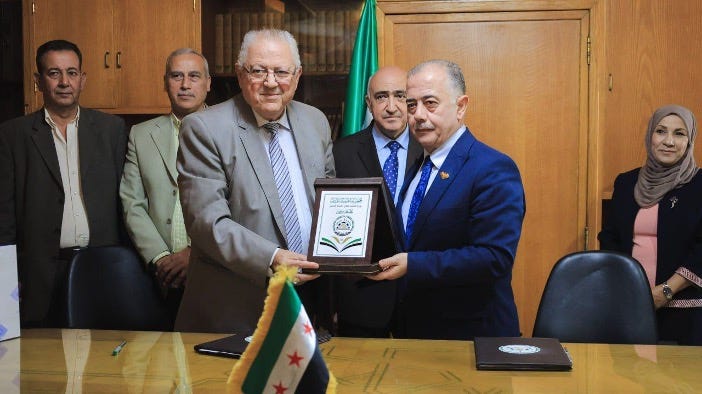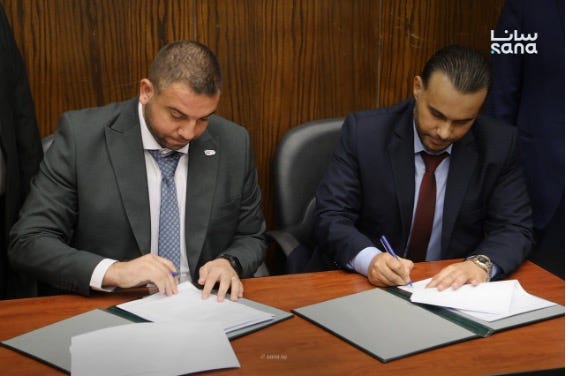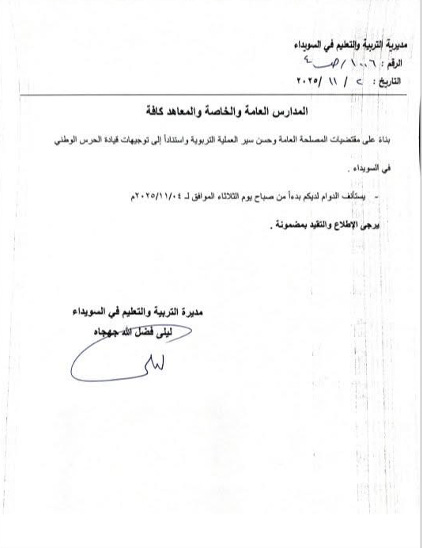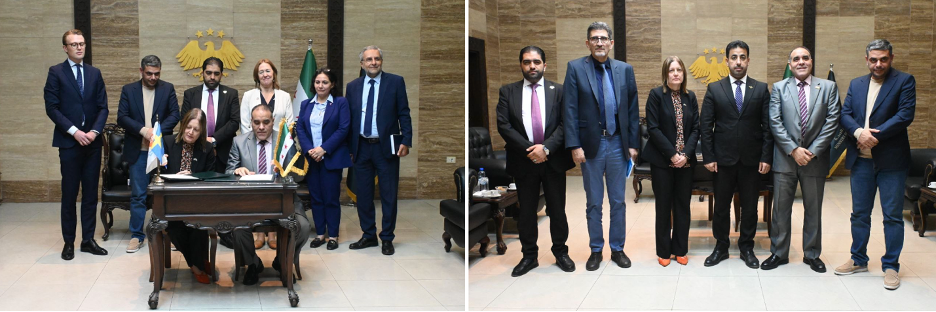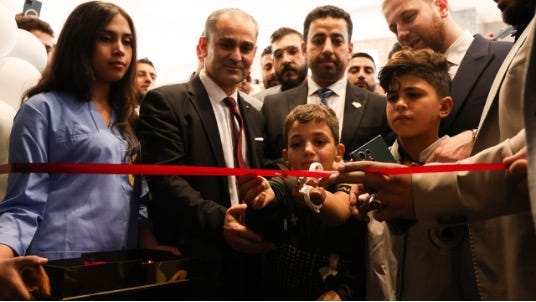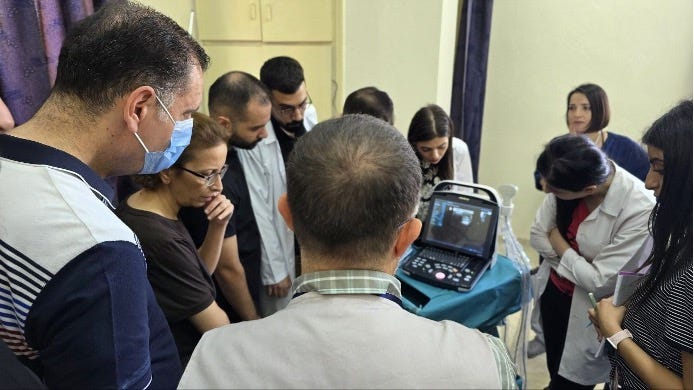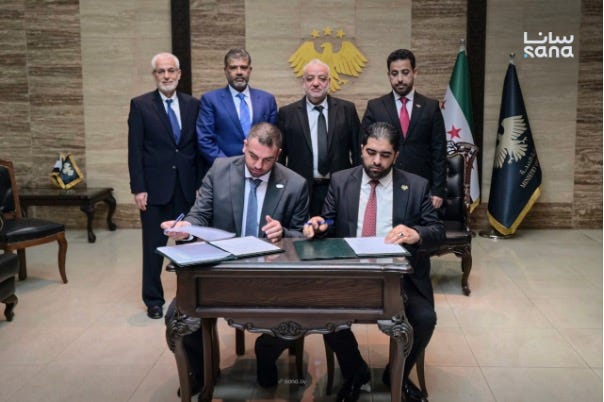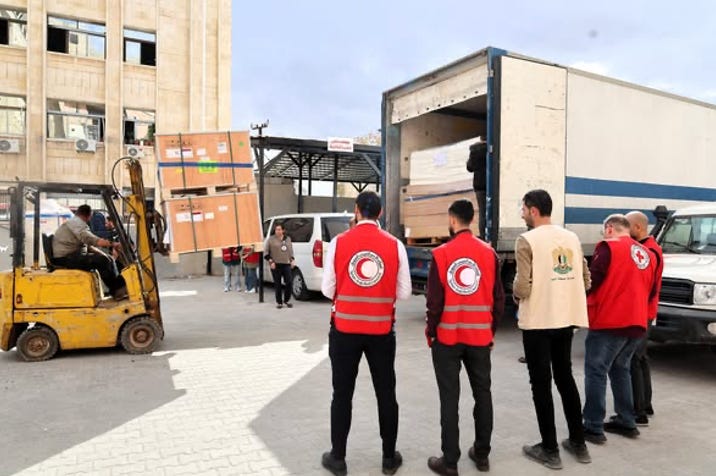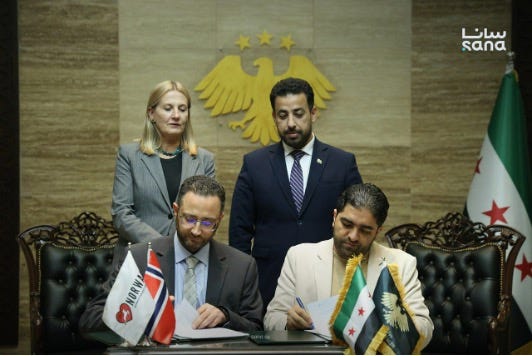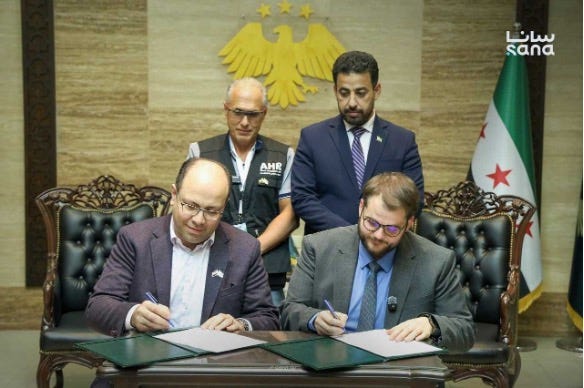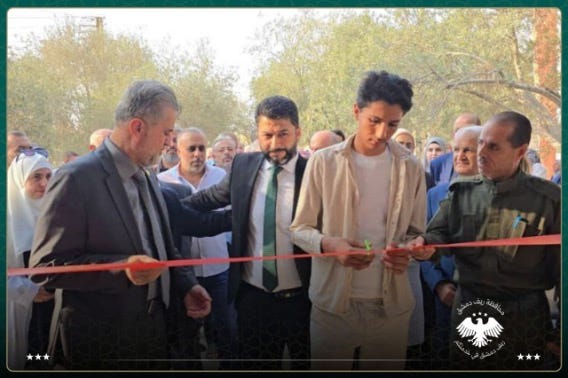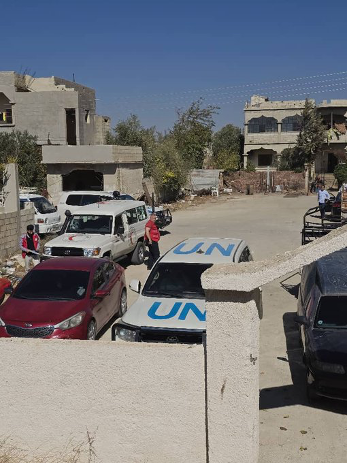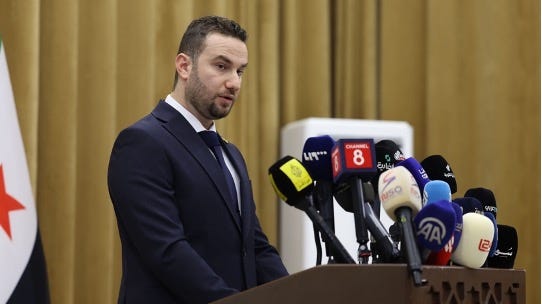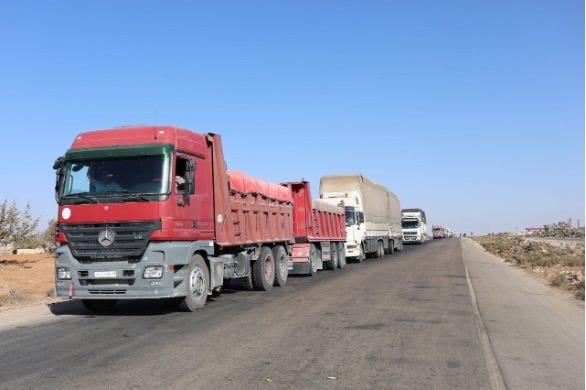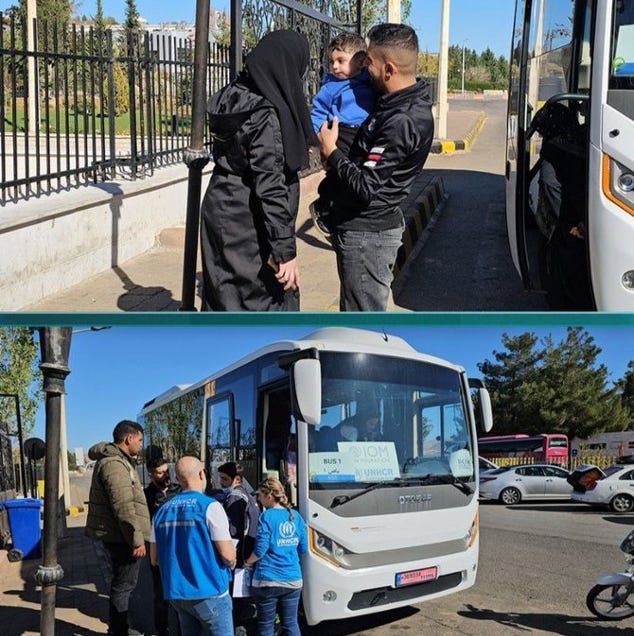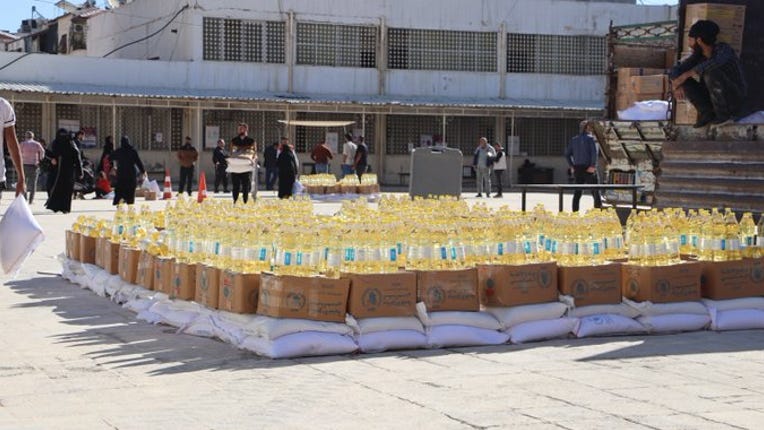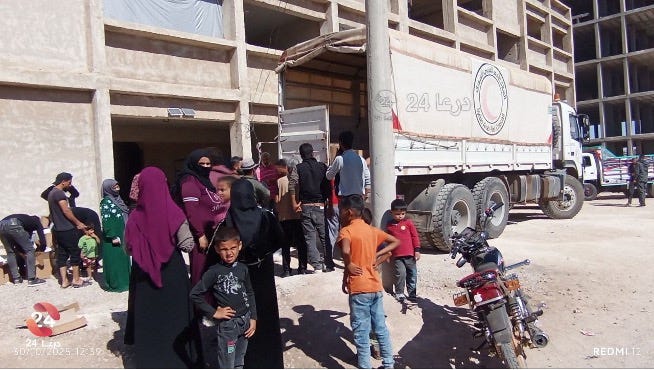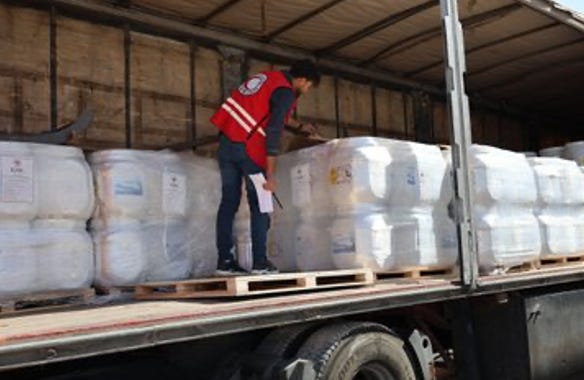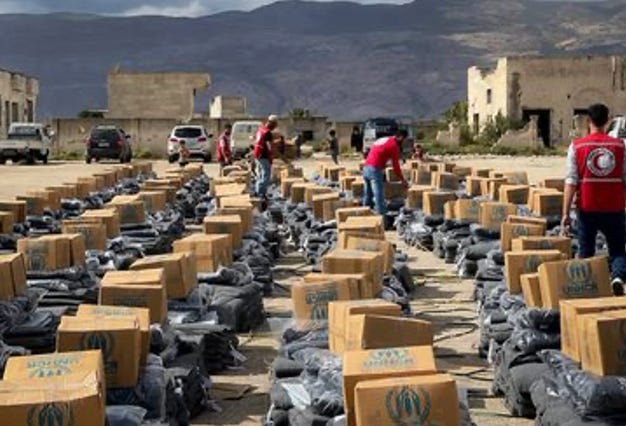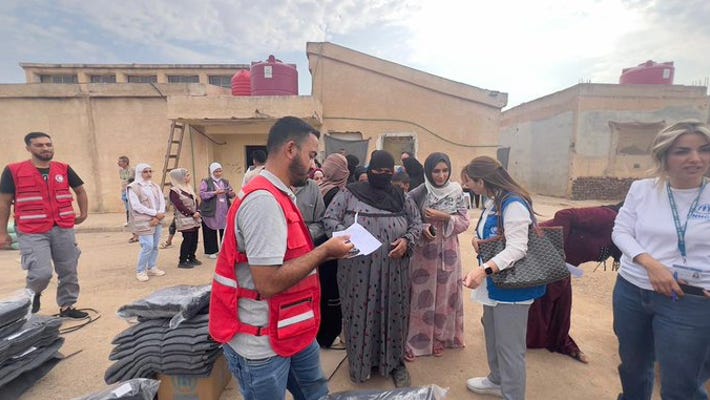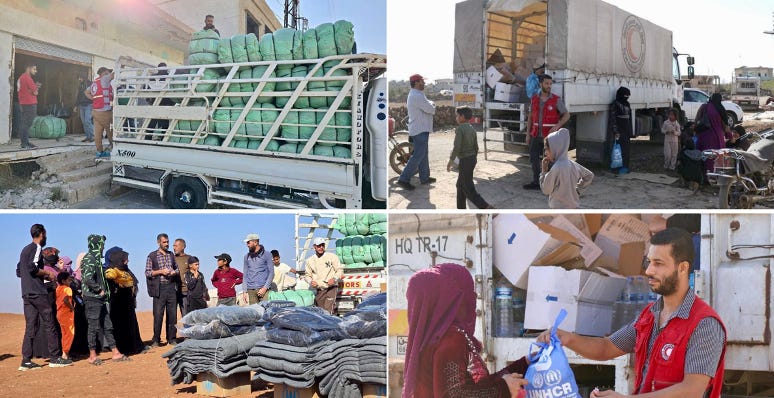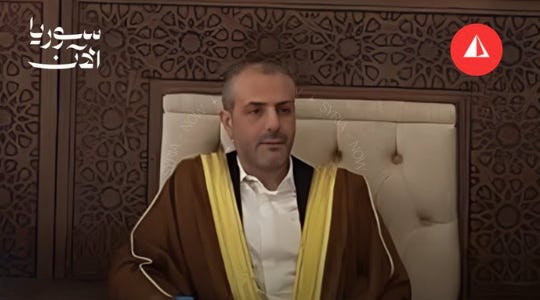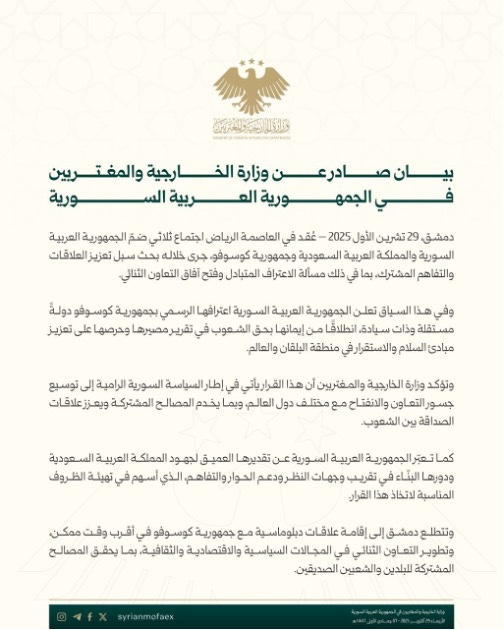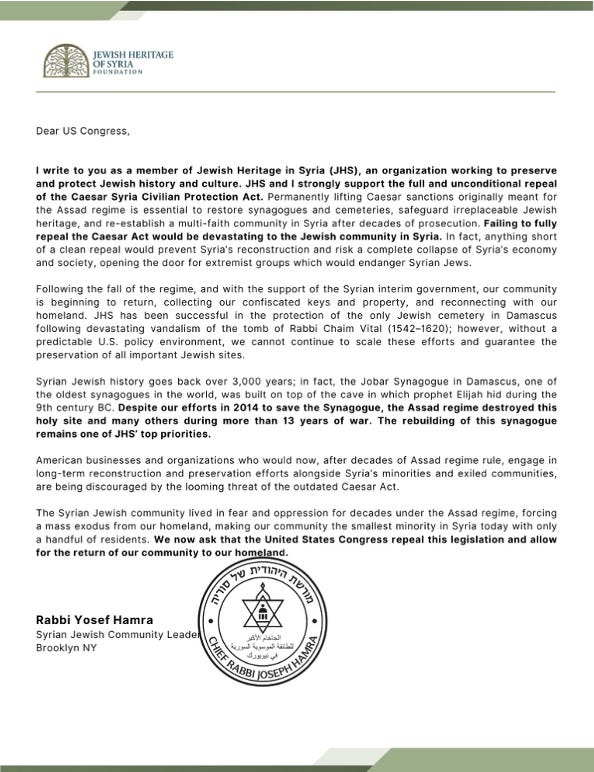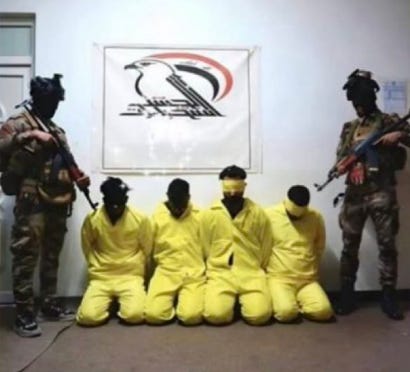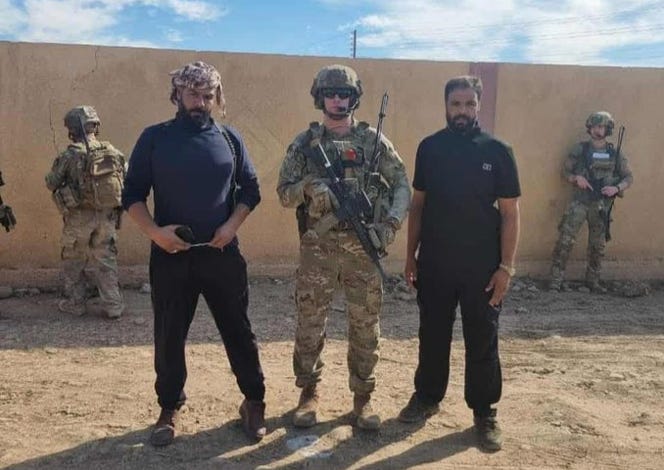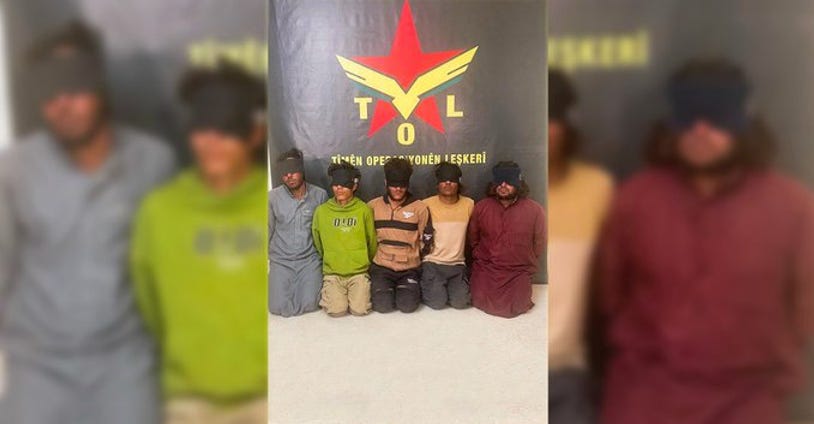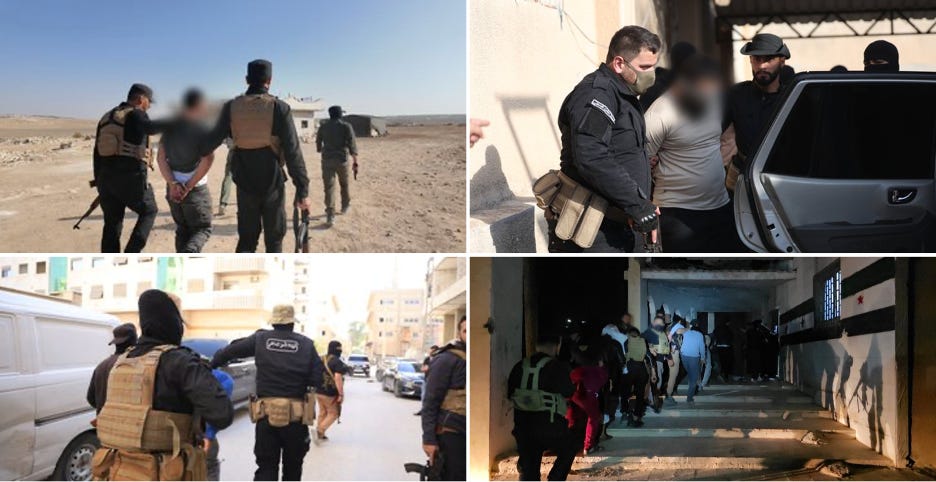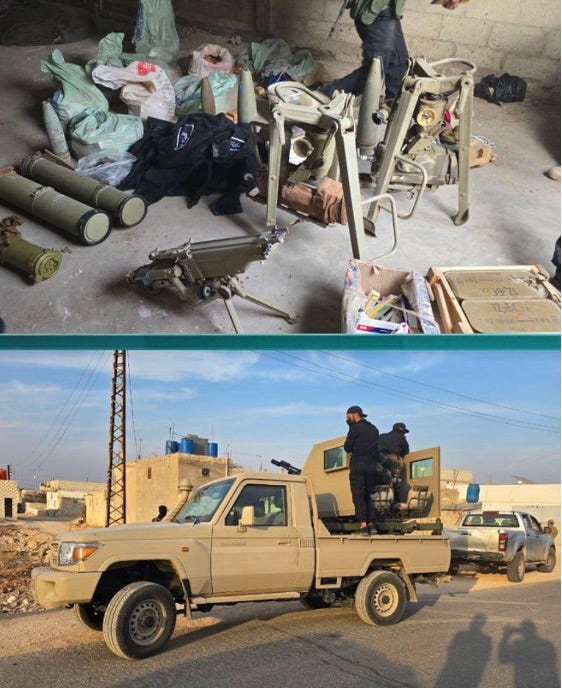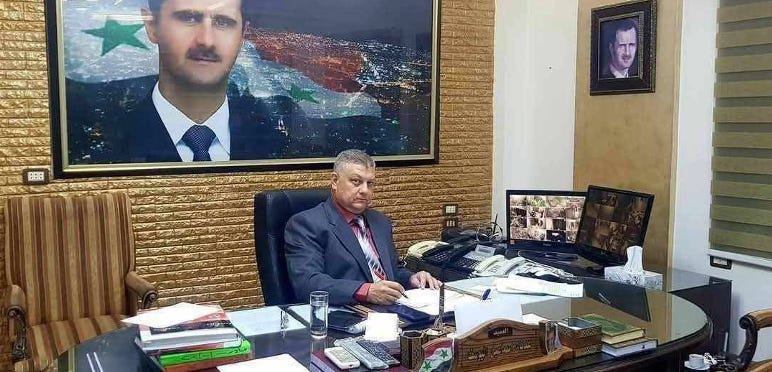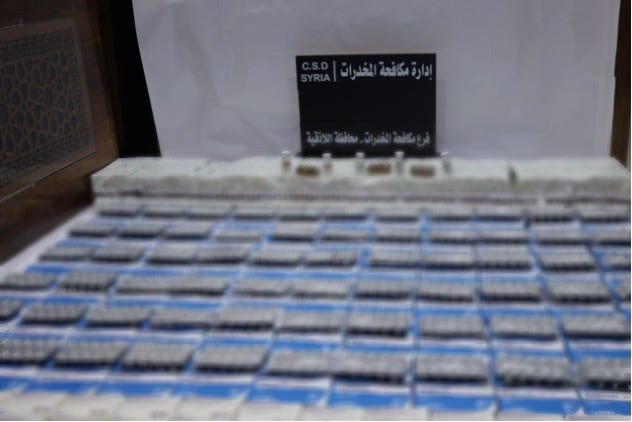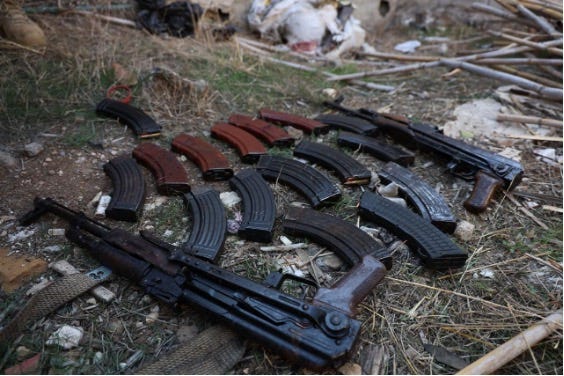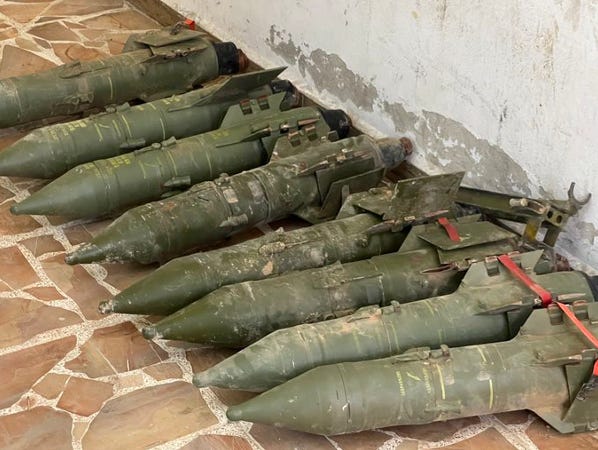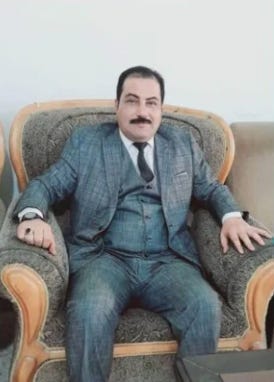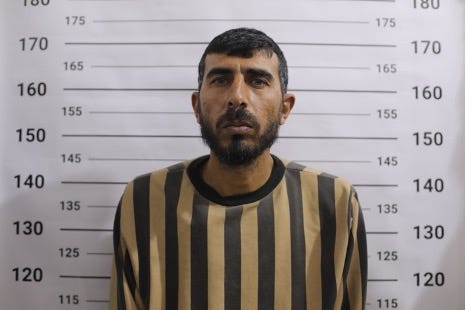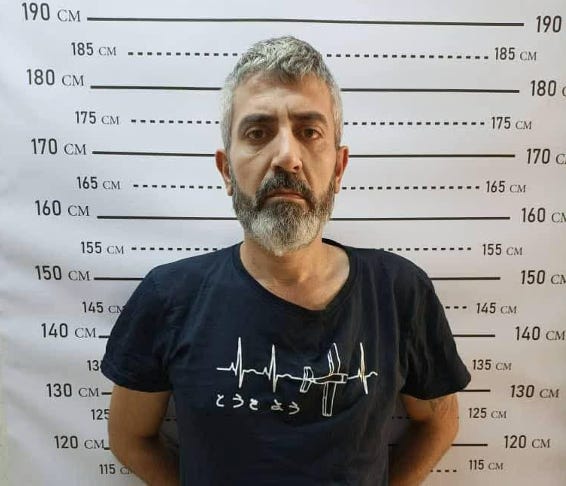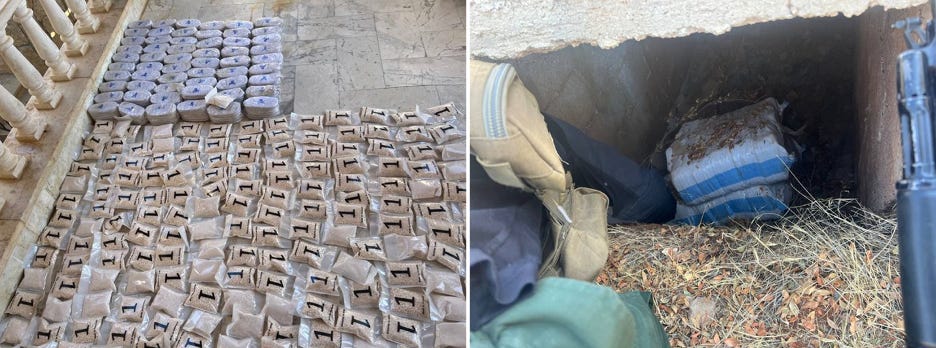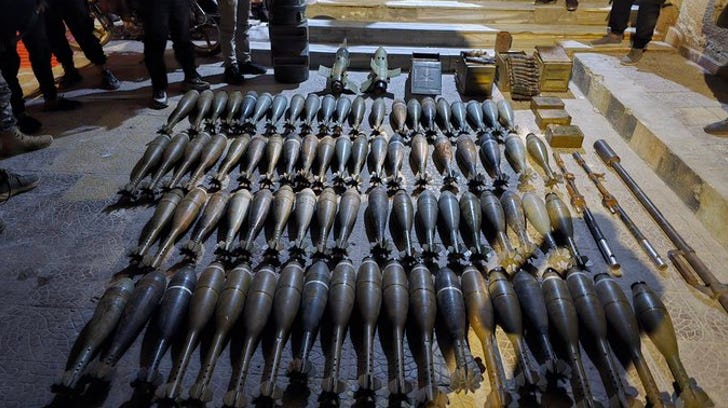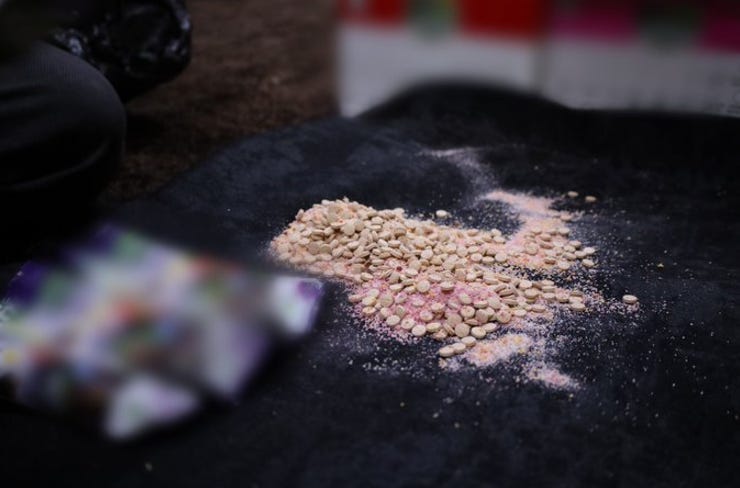FREE -- Syria Weekly: October 28 - November 4
Dear readers & subscribers — apologies for this double-week edition. I’ve just completed another extended trip to Syria and was unable to get last week’s post prepared in time. This catches things up. More updates from the visit in this week’s video.
SYRIA’S TRANSITION:
Transition Meetings:
October 28:
While in Saudi Arabia on October 28, President Ahmed al-Sharaa met with Foreign Minister Faysal bin Farhan al-Saud, Interior Minister Abdulaziz bin Saud al-Nayef al-Saud; Minister of Investment Khalid al-Falih; FIFA President Gianni Infantino; and a delegation of prominent international investors.
Finance Minister Mohammed Barniyeh met on October 28 with CEO of the Saudi Development Fund Sultan al-Morshed in Riyadh, Saudi Arabia to discuss how best to facilitate Saudi funding for planned investments in health, education, energy, housing, aviation, and small and medium enterprises.
Minister of Defense Murhaf Abu Qasra traveled to Moscow, Russia on October 28 for a 3-day visit and met with his counterpart Andrey Belousov, during which they discussed shared security interests.
Minister of Information Hamza al-Mustafa visited Greek Orthodox Patriarch John X Yazigi in Damascus on October 28, to discuss “national identity, responsible media practices, the protection of Syrian values, and the fight against disinformation.”
The Syrian-Jordanian Committee for Land Transport convened in Amman, Jordan on October 28 and discussed further the plans for “upgrading passenger and freight transport” sectors, and cooperation in developing railways.
A technical delegation from the Foreign Ministry traveled to Moscow, Russia on October 28 to begin work at the Syrian Embassy aimed at reactivating and improving consular and administrative services.
Minister of Transport Yaroub Badr hosted a meeting with the World Bank’s Director of Transport in the Middle East and North Africa, Ibrahim al-Dajani on October 28 to discuss the bank’s plans to support the development of Syria’s transport infrastructure.
The Director of Syria’s General Authority for Land and Sea Ports, Qutaiba Badawi, hosted a meeting on October 28 with Jordanian Ambassador Sufyan al-Qudah on October 28 to discuss the development and expansion of border crossing infrastructure between Jordan and Syria.
The director of Syria’s Federation of Chambers of Commerce, Alaa Al-Ali, met with South Korean Ambassador Gyosik Jun in Damascus on October 28.
Minister of Justice Mazhar al-Ways met with Minister of Education Mohammed Turko on October 28 to discuss plans to repeal a series of laws relating to education that are no longer necessary “in the current stage.”
Governor of Latakia Mohammed Othman hosted a meeting with Syrian-American businessman Mohammed al-Khayyat and his delegation on October 28.
Governor to Suwayda Mustafa Bakkour met with the Deputy Minister of Energy responsible for electricity affairs on October 28 to discuss ways to improve the power supply into Suwayda governorate.
The Director of Political Affairs in Idlib, Hassan al-Khatib, hosted a meeting with a delegation of Christian leaders, including Priests Khukaz Masroub and Louay Bishrat on October 28, to discuss issues relating to social cohesion, returning refugees and local service needs.
Governor of Hama Abdulrahman al-Suhyan hosted a meeting with the President of the Syrian American Council, Farouk Bilal, on October 28.
October 29:
While in Saudi Arabia for a second day, President Ahmed al-Sharaa met with Chairman of the Board of the al-Marai Company, Prince Nayef bin Sultan al-Saud; CEO of the Saudi Telecom Company (STC) Aliyan al-Wateed; Deputy Governor of the Saudi Investment Fund Yazid al-Humayd; Executive Vice President of the Salik Company, Ahmed Shahini; the Chairmen of the Saudi-French BSF Bank and Alinma Bank, Mazen al-Rumaihi and Abdulmalik al-Huqayl; Chairman of the Saudi-Syrian Business Council Mohammed Abu Nahyan; and Saudi Minister of Communications and Information Technology, Abdullah al-Sawahah.
Later that day, President al-Sharaa participated in a one-on-one panel during which he said:
“The economy in the region is linked to regional and strategic security, and Syria forms a fundamental pillar in the stability of the region. The world has experienced Syria being unstable and a source of drugs, which caused great risks to the region… Our first foreign visit was to Saudi Arabia because we recognize its pivotal and leading role in the region. What the world will gain from Syria’s stability is that it represents an important strategic location in the region; it has historically been the gateway to the East and the well-known Silk Road, with diverse resources and an economy that is varied and not dependent on a single sector… Syria has opened up to the world today and started a new chapter in a short period; within 10 months, it was able to return to its regional and global position with the support of many countries, foremost among them Saudi Arabia… We have amended investment laws in Syria until they became among the best in the world, and within the first six months, investments worth 28 billion dollars entered… and there are investment projects with Bahrain and Jordan, and some American companies have taken some investments along with other regional partnerships… I am ready to give the rest of my life to see Syria rise and be strong, and I am determined, along with all Syria’s lovers, to rebuild it anew.”
Following the public session, President al-Sharaa met with Saudi Crown Prince Mohammed bin Salman and discussed Syria’s ongoing transition, areas of investment and economic cooperation, and regional developments.
President Ahmed al-Sharaa also met with Kosovan President Vjosa Osmani, during which he confirmed that Syria’s government had formally recognized the Republic of Kosovo.
Minister of Information traveled to Beirut, Lebanon on October 29 to participate in the 21st Arab Media Forum, under the patronage of President Joseph Aoun.
On the sidelines of the forum, Minister Hamza also met with Abdullah bin Mohammed bin Bati al-Hamed, Head of the UAE’s National Media Office.
A delegation from Syria’s Interior Ministry, led by Deputy Minister for Security Affairs, Brigadier General Abdulqader Tahhan, traveled to Beirut, Lebanon on October 29 and met with counterparts from General Security and Lebanese Internal Security. The delegation also included officials from the Interior Ministry’s Counterterrorism, Criminal Investigation, Border Crossings, Special Tasks and Intelligence departments.
Minister of Justice Mazhar al-Ways hosted a meeting with a delegation of EU MPs in Damascus on October 29, during which they discussed potential opportunities for European support to Syria’s justice system, including to judicial modernization and combating organized crime.
Later that day, Minister al-Ways met with the head of the National Commission for Transitional Justice, Abdul Basit Abdul Latif, and the head of the High Commission for Missing Persons, Muhammad Reda Jalakhi to discuss the need for greater level of coordination.
Minister of Transport Yaroub Badr hosted a meeting with a delegation of Turkish companies on October 29 to discuss a number of strategic projects in the transport sector, including those relating to road and railway infrastructure.
Minister of Health Musab al-Ali traveled to Hama and participated in a seminar alongside Governor Abdulrahman al-Sahyan to discuss the province’s health sector with a large group of doctors, pharmacists, nurses and dentists.
A delegation from Syria’s Directorate of Antiquities and Museums traveled to Lausanne, Switzerland on October 29 to participate in a conference focused on Palmyra – organized by UNESCO, the ALIPH Fund, and Syrian authorities.
Minister of Health Musab al-Ali hosted a meeting with the EU Ambassador Michael Ohnmacht and a delegation of four members of the EU Parliament in Damascus on October 29.
Minister of Public Works and Housing Mustafa Abdulrazzaq inaugurated the “Reconstruction of Syria 2025” expo at the Damascus Exhibition City grounds on October 29.
October 30:
President Ahmed al-Sharaa and Foreign Minister Asaad al-Shaybani hosted a meeting with the German Foreign Minister Johann Wadephul on October 30. In a subsequent press conference, Minister Wadephul announced that a Syrian-German Business Council had been established during his visit and that an additional €39.4 million ($45.4 million) of humanitarian aid would be provided to support food security, health, shelter and reconstruction needs in Syria.
A delegation from Syria’s Interior Ministry traveled to Doha, Qatar on October 30 to participate in the 14th Arab Conference for Security Training Directors.
Interior Minister Anas Khattab hosted a meeting with the Ismaili Council from Salamiya in Hama on October 30.
Minister of Tourism Mazen al-Salhani hosted a meeting with Nayef bin Eid al-Thani, the Chairman of the Retaj Hotels Group, in Damascus on October 30 to discuss potential investment prospects in the hotel sector.
Minister of Social Affairs and Labor Hind Kabawat hosted a meeting with a delegation of EU MPs in Damascus on October 30, to discuss ongoing efforts to support and empower women amid Syria’s transition.
Later that day, Minister Kabawat also hosted a meeting with Azerbaijan’s Ambassador to Syria Alnur Shah Husseinov.
A Defense Ministry delegation led by the Chief of the General Staff Major General Ali al-Naasan and the commander of the 56th Division, Brigadier General Munir al-Sheikh traveled to Tartus on October 30 and met with Governor Ahmed al-Shami and other officials from the governorate’s security apparatus in order to discuss ways to strengthen coordination and efficiency.
Minister of Information Hamza al-Mustafa met with the Al-Maha International Company on October 30 to discuss plans to establish and construct the Damascus Media Gateway City.
Minister of Transport Yaroub Badr hosted a meeting with Jordan’s Ambassador to Syria Sufyan al-Qudah on October 30 and discussed the country’s bilateral cooperation on cross-border transport.
Governor of Latakia Mohammed Othman hosted a meeting with representatives of all NGOs active in the governorate on October 30 in order to discuss their ongoing work, their needs, and recommendations.
October 31:
Minister of Economy and Industry Nidal al-Shaar led a delegation of Syrian economic and finance officials to Turkey on October 31 for an official visit focused on “revitalizing economic ties and strengthening trade relations between Syria and the member countries of the Organization of Islamic Cooperation (OIC).”
Minister of Information Hamza al-Mustafa traveled to Istanbul, Turkey on October 31 to participate in the TRT World Forum 2025.
A delegation from Saudi company ACWA Energy visited Damascus on October 31 and held meetings at the Ministry of Energy and General Corporation for Electricity Generation, to discuss implementing investment deals to expand Syria’s electricity production and delivery capacity.
Authorities in Kafranbel in southern Idlib hosted a crowdfunding campaign to support reconstruction and rehabilitation late on October 31, with approximately 3,000 people in attendance. More than $3 million was raised by the end of the night.
November 1:
Foreign Minister Asaad al-Shaybani hosted a meeting with the Committee investigating the July violence in Suwayda on November 1, during which he discussed their progress in “uncovering the truth” so that justice and accountability could be achieved.
Later that day, Foreign Minister Shaybani traveled to Manama, Bahrain in order to participate in the Manama Dialogue, where he met on the sidelines with Advisor to French President Emmanuel Macron, Anne Claire Legendre.
Deputy Minister of Economy and Industry Bassel Abdul Hannan traveled to Istanbul, Turkey on November 1 to participate in the COMCEC meeting focused on economic cooperation within Islamic countries.
A delegation from Syria’s Central Authority for Financial Control traveled to Cairo, Egypt on November 1 to participate in the 25th Congress of the International Organization of Supreme Audit Institutions (INTOSAI).
A delegation from Syria’s Interior Ministry traveled to Doha, Qatar on November 1 to participate in the Arab Conference for Security Training.
Interior Minister Anas Khattab hosted a meeting with a delegation of notables from Palmyra in Damascus on November 1, to hear their views on services, security and needs.
November 2:
Foreign Minister Asaad al-Shaybani participated in a session at the Manama Dialogue in Bahrain on November 2 focused on the management of political transitions.
While there, he also met on the sidelines with Lebanese Interior Minister Ahmed al-Hijjar; UAE President Anwar Gargash; Bahraini Foreign Minister Abdullatif bin Rashid al-Zayani; Bahraini Minister of Finance and Economy Salman bin Khalifa al-Khalifa
Minister for Economy and Industry Nidal al-Shaar traveled to Turkey on November 2 for meetings with his Turkish counterparts to discuss boosting trade, incentivizing private sector investment, and facilitating bilateral cooperation.
Minister of Health Musab al-Ali hosted a meeting with Libyan Ambassador Walid Ammar on November 2, during which they discussed cooperation in the health sector, as well as potential opportunities for pharmaceutical investment in Syria.
Jordan’s Ambassador to Syria Sufyan al-Qudah hosted a meeting with a delegation from the Middle East Institute in Washington DC, led by General (ret’d) Joseph Votel, Ambassador (ret’d) Stu Jones and Charles Lister in the Jordanian Embassy on November 2.
Later that day, the Middle East Institute delegation also met with Turkish Ambassador Burhan Koroglu and EU Charge d’Affairs to Syria Michael Ohnmacht.
A delegation from the Interior Ministry traveled to Turkey on November 2 to participate in the International Corrections and Prisons Association conference, during which issues of prisoner welfare, rehabilitation and prisons expertise were discussed and shared.
Local authorities convened a fundraiser in the town of al-Kiswah south of Damascus late on November 2 and succeeded in raising more than $2 million to support the rehabilitation of local services and housing.
November 3:
President Ahmed al-Sharaa chaired a meeting with Interior Minister Anas Khattab and security commanders from across Damascus on November 3.
Later that day, President al-Sharaa also chaired a meeting of Syria’s Supreme Development Council, during which ministers, governors and other senior government officials discussed the state of existing and incoming investments and service projects nationwide. Participants also reviewed results coming from the recently concluded Future Investment Initiative Conference in Saudi Arabia.
Minister of Energy Mohammed al-Bashir traveled to Abu Dhabi, UAE on November 3 to participate in the Abu Dhabi International Petroleum Exhibition and Conference (ADIPEC) 2025. On the sidelines of the conference, Minister al-Bashir held meetings with French energy firm Total, as well as the Saudi Energy Company, Siemens and Chevron.
Minister of Education Mohammed Turko traveled to Samarkand, Uzbekistan on November 3 to participate in the UNESCO General Conference.
Minister of Finance Mohammed Barniyeh, Minister of Health Musab al-Ali, Minister of Agriculture Yaroub Badr and Governor of Deir ez Zour Ghassan al-Sayyed Ahmed convened the inaugural strategy meeting for Vision 2040 in Deir ez Zour city on November 4.
Minister of Emergency and Disaster Relief Raed al-Saleh hosted a meeting with a delegation from the Middle East Institute in Washington DC, led by General (ret’d) Joseph Votel, Ambassador (ret’d) Stu Jones and Charles Lister.
Later that day, Senior Advisor to President Ahmed al-Sharaa also hosted the delegation from the Middle East Institute at the Prime Minister’s building in Damascus.
Governor of Aleppo Azzam al-Gharib hosted a meeting with a visiting delegation from Turkey led by Director of Environment Policies and Urban Planning in the AK Party, Sevilay Tunger and Fatma Sahin, Mayor of Gaziantep on November 3 to discuss joint cooperation in culture, antiquities, roads, bridges, health and water sectors.
Governor of Tartus Ahmed al-Shami hosted a meeting with a delegation from the Emirates International Charity Foundation, led by Musab al-Nasif al-Nuaimi on November 3, during which they discussed potential assistance and cooperation in Syria’s education sector.
Representatives of the city of Paestum in Salerno, Italy signed a twinning agreement with the city of Palmyra on November 3 – in a ceremony presided over by Syria’s Minister of Tourism Mazen al-Salhani.
November 4:
Foreign Minister Asaad al-Shaybani hosted a meeting with a delegation from the Middle East Institute in Washington DC, led by General (ret’d) Joseph Votel, Ambassador (ret’d) Stu Jones and Charles Lister at the Tishreen Palace on November 4.
Later that day, Governor to Suwayda Mustafa Bakkour hosted a meeting in his home in Damascus late on November 4 with the Middle East Institute delegation, led by General (ret’d) Joseph Votel, Ambassador (ret’d) Stu Jones and Charles Lister.
Minister of Energy Mohammed al-Bashir met with Deputy U.S. Secretary for Energy James Danly in Abu Dhabi, UAE on November 4 to discuss energy investments in Syria.
Latakia Governor Mohammed Othman hosted a meeting with Mohammed Reda Jalkhi, the leader of Syria’s National Commission for the Missing on November 4 in order to discuss ongoing plans to establish a nationwide “coordination framework.”
Governor of Daraa Anwar al-Zoubi hosted a visit by Italian Ambassador to Syria Stafano Ravagnan on November 4, during which they met for talks and then toured Busra al-Sham.
Governor of Tartus convened a meeting with his provincial Health Director Alaa Barhoum and the newly appointed provincial hospital directors – Hossam Hassan and Ali Barakat – on November 10 to discuss the state of Tartus’ health sector and their current needs.
November 5:
Minister of Information Hamza al-Mustafa hosted a meeting with a delegation from the Middle East Institute in Washington DC, led by General (ret’d) Joseph Votel, Ambassador (ret’d) Stu Jones and Charles Lister in Damascus on November 5.
Later that day, the Middle East Institute delegation were also hosted for meetings with Interior Minister Anas Khattab at the Tishreen Palace and later with Minister of Communications and Information Technology Abdulsalam Haykal.
Minister of Health Musab al-Ali hosted a meeting with French Charge d’Affairs Jean-Baptiste Faivre on November 5.
Minister of Agriculture Amjad Badr hosted a working meeting with Italy’s IZSUM organization to discuss paths for collaboration in livestock management and disease control.
The Ministry of Energy signed a memorandum of understanding with the France-based Agency for Technical Cooperation and Development (ACTED) on November 5 to provide support to water projects, data exchange, and capacity building Syria’s water network.
Governor of Hama Abdulrahman al-Sahyan hosted a meeting with the WFP director for Central Syria, Tiyungi Mashiunakia on November 5.
November 6:
President Ahmed al-Sharaa arrived in Belem, Brazil on November 6 to participate in the COP30 international climate conference alongside Foreign Minister Asaad al-Shaybani and Minister of Local Administration and Climate Mohammed Anjarani.
In addition to addressing COP30, President al-Sharaa also met on the summit sidelines with the following foreign officials and leaders:
Brazilian President Luiz Inacio Lula da Silva
UN Secretary General Antonio Guterres
Italian Deputy Prime Minister and Foreign Minister Antonio Tajani
President of the World Bank, Ajay Banga
Turkish Vice President Cevdet Yilmaz
Deputy Chairman of the Yemeni Presidential Leadership Council, Tareq Saleh
Dutch Prime Minister Dick Schoof
French President Emmanuel Macron
Minister of Energy Mohammed al-Bashir signed the final contract agreement with UCC Holding on November 6 for the construction of 4 power plants in Syria with a total production capacity of 5,000 MW – one located in northern Aleppo; two in Deir ez Zour (outside the city and in Zizoun) and one in Mahradeh, Hama. An additional 1,000 MW will be produced in four newly constructed solar sites across Syria.
In a subsequent interview with al-Ikhbariya, Communications Director at the Energy Ministry Ahmed al-Suleiman, said it would take three years to construct the new power stations and that citizens would notice a “significant improvement” in electricity supply within 18 months.
The Syrian Committee to Investigate the Missing Persons signed a cooperation agreement with the International Commission on Missing Persons, the UN’s Independent Institution on Missing Persons in Syria and the ICRC Syria on November 6.
Justice Minister Mazhar al-Ways hosted a meeting with the Arab Lawyers Union in Damascus on November 6 in order to discuss cooperation in supporting Syria’s ongoing process of judicial reform.
November 7:
President Ahmed al-Sharaa continued his participation in the COP30 international climate conference on November 7 alongside Foreign Minister Asaad al-Shaybani and Minister of Local Administration and Climate Mohammed Anjarani. That day, he met on the summit sidelines with the following foreign officials and leaders:
Director General of the WHO, Tedros Adhanom Ghebreyesus
Finland President Alexander Stubb
Spain Prime Minister Pedro Sanchez
A delegation from Syrian Airlines, led by Director General Samer Orabi, traveled to Rabat, Morocco on November 7 to participate in the Arab Air Carriers Organization (AACO) conference.
Germany’s Charge d’Affairs Clemens Hach traveled to Aleppo on November 7 and met with Governor Azzam al-Gharib to discuss early recovery and development projects.
November 8:
President Ahmed al-Sharaa and Foreign Minister Asaad al-Shaybani arrived in Washington DC late on November 8. That evening, they convened meetings with the Syrian American community to discuss their activities both inside the U.S. and Syria.
Minister of Tourism Mazen al-Salhani traveled to Riyadh, Saudi Arabia on November 8 and met with his Saudi counterpart Ahmed al-Khatib to discuss existing and future investments in Syria’s tourism sector.
November 9:
President Ahmed al-Sharaa convened large meetings with the Syrian American community in Washington DC on November 9, alongside Ambassador Thomas Barrack.
That day, President al-Sharaa also visited the IMF and met with Managing Director Kristalina Georgieva and senior management to discuss ongoing and planned future IMF support to Syria in transition.
Later that day, President Ahmed al-Sharaa held meetings with a number of U.S. members of Congress, including Joe Wilson. One particularly important meeting was with the Chairman of the House Foreign Affairs Committee Brian Mast, with the facilitation of Tareq and Yasmine Naamo, during which they discussed the fate of the Caesar Act.
A delegation from the Interior Ministry traveled to Nevsehir, Turkey on November 9 to participate in the INTERPA conference focused on combating cybercrime.
Minister of Information Hamza al-Mustafa met with Central Bank Governor Abdulkader Husriyeh on November 9 in order to begin planning for the release of Syria’s new currency.
Minister of Energy Mohammed al-Bashir traveled to Aleppo and met with Governor Azzam al-Gharib to discuss plans to rehabilitate and expand the governorate’s electricity infrastructure.
Minister of Higher Education Marwan al-Halabi hosted a meeting with UK Special Envoy to Syria Ann Snow in Damascus on November 9 to discuss academic cooperation, reactivating the Chevening Scholarship Program, and providing support to English language centers in Syria.
November 10:
President Ahmed al-Sharaa met with U.S. President Donald Trump in the White House on November 10 – the first Syrian leader to have done so in history. During the meeting, President al-Sharaa reportedly confirmed Syria’s political accession into the Counter-ISIS Coalition, while the U.S. confirmed Syria could now look to resume operations at its Embassy in Washington DC.
Immediately following the meeting in the Oval Office, a separate meeting was held first with U.S. Secretary of State Marco Rubio and then with Turkish Foreign Minister Hakan Fidan.
Later that day, President al-Sharaa held additional meetings with senior figures from Congress and a discussion with senior editors and correspondents from the Washington Post. That night, he spoke at a working dinner convened by the U.S. Chamber of Commerce.
Minister of Transport Yaroub Badr traveled to Cairo, Egypt to participate in the 38th Council of Arab Transport Ministers summit.
Interior Minister Anas Khattab presided over a graduation ceremony for a batch of newly recruited and trained Public Security forces in Tartus on November 10.
Governor of Latakia Mohammed Othman traveled to Damascus on November 10 and met with Minister of Social Affairs and Labor Hind Kabawat.
Governor to Suwayda Mustafa Bakkour hosted a meeting with the Investigative Committee responsible for looking into the violence in Suwayda in July, in order to discuss provision of enhanced logistical support as they continue their work inside and outside of Suwayda governorate.
Later in the day, Governor to Suwayda Bakkour also hosted a meeting with UNHCR and SARC to discuss ways to enhance cooperation in providing humanitarian assistance to all of those in need.
French Ambassador to Syria Jean-Baptiste Faivre met with SARC President Dr. Hazem Baqla in Damascus on November 10 and discussed cooperation with the French Red Cross and ongoing humanitarian support across Syria.
Appointments:
Minister of Local Administration and Environment, Mohammed Anjarani, appointed Ahmed Kurdi as the General Director for Local Administration and Environment in Aleppo governorate on October 28.
Syrian media reported on October 29 that Daraa’s Internal Security Commander Brigadier General Shaher Omran had been appointed as the Deputy Head of the General Intelligence Directorate and Mohammed al-Sukhni would replace him in his prior role in Daraa.
Long-time military media activist Abdulmuin Qabba Qalil was appointed as an officer within the Defense Ministry’s Media and Communications Department on October 31.
Colonel Abdel Ghani was appointed as the commander of Syria’s Border Forces on November 4.
The Interior Ministry appointed Brigadier General Mohammed Ibrahim al-Sukhni as the Commander of Internal Security in Daraa on November 5.
Aleppo Governor Azzam al-Gharib appointed Ali Othman Hanoura as the Deputy Supervisor of al-Atareb, al-Safira, Deir Hafer and Jabal Samaan.
Political Developments:
Member of the Supreme Committee for the People’s Assembly Elections, Anas al-Abdeh, said in public remarks on November 1 that the new parliament would vote on approving laws based on a majority of two-thirds and its immediate priority upon formation will be steps aimed at “enhancing services and easing the burdens on citizens.” Abdeh added that approximately 800 Assad regime-era laws placed “great pressure on citizens and ministries” and would be considered for amendments or cancellation.
Governor to Suwayda Mustafa Bakkour confirmed on November 2 that he had signed paperwork approving payment of salaries for employees of 29 government directorates within Suwayda following a series of delays caused by a refusal to coordinate with authorities in Damascus and to “follow approved procedures.”
Foreign Minister Asaad al-Shaybani formally reinstated approximately 20 diplomats on November 3 who had previously defected during Assad’s regime back into the foreign service. They were named as:
Basil Niyazi
Maher Al-Jammaz
Khaled Al-Ayubi
Khaled Al-Saleh
Hussein Sabbagh
Dani Baaj
Dr. Hussam Al-Hafiz
Ahmed Al-Hariri
Ayham Adi
Mahmoud Obeid
Lamia Al-Hariri
Yahya Diab
Ayham Al-Ghazi
Fadel Al-Rifai
Ahmed Shabib
Bashar Al-Haj Ali
Rashid Yahya
Imad Al-Ahmar
Luma Al-Ahmad
The Ministry of Interior confirmed on November 8 that more than 1 million passports had been issued to citizens since Assad’s fall 11 months earlier and that more than 5 million names had been removed from state wanted lists and travel bans.
The municipal council in al-Rastan voted on November 8 to dismiss its Mayor, Mohammed al-Rahhal, following widespread local complaints regarding his prior connections to Assad’s regime. Governor Abdulrahman al-Aamah approved the vote and formally dismissed him on November 9.
In an interview with al-Arabiya on November 9, Syria’s Permanent Representative to the UN, Ibrahim al-Olabi said negotiations with Israel over a security agreement continued, with the 1974 Disengagement Accord being the “starting point” for talks and discussions around “border posts”, troop levels and weapons deloyments being the core issues for negotiation.
The U.S. Department of the Treasury issued a new 6-month waiver for the Caesar Act on November 10, in anticipation of the expiration of the previous waiver issued in May 2025.
Economic Developments:
On the sidelines of the Future Investment Initiative in Saudi Arabia, it was confirmed that Bank Bemo Saudi Fransi had reconnected its banking channels into Saudi-based banks after 15 years of suspension. In so doing, the bank had facilitate the first official financial transfer from Saudi Arabia’s Ministry of Investment.
The Ministry of Energy announced on October 30 that from November it would be increasing the price of electricity in an attempt to control consumption, increase efficiency and ensure the continuity of supply. Higher prices would allow additional revenue to be spent on “maintenance works, reducing financial losses, enhancing generation and supply capacity, and accelerating rehabilitation and restoration work.” The new prices were set at two different tiers that would primarily be determined by low-income households or medium-to-high income households – with the former paying : SYP 600 for consumption per kWH (up to 300KW) and the latter paying SYP 1,400 per kWh (over 300KW). The Ministry added that alongside electricity price increases, the cost of fuel would be reduced – with diesel falling from 95 to 83 cents (and later to 75 cents) and gasoline from $1.1 to $1 (and later to 85 cents).
In an interview with Reuters published on October 31, the CEO of the Saudi-Syrian Business Council said that Saudi companies planned to invest billions of dollars in Syria over the next 5 years – including ACWA Power, Saudi Telecom Company (STC) and more. However, he added that the U.S. Caesar Act remains an obstacle “choking” the Syrian economy.
A ship carrying 23,500 tonnes of Ukrainian wheat arrived into the Port of Latakia on November 2, delivering its contents to Syria’s Grain Establishment.
Syrian media reported on November 4 that 3,031 industrial and manufacturing projects had been licensed by the transitional government since December 2024 – including in the chemical, engineering, food and textile sectors.
The UK’s Department for Business and Trade confirmed on November 5 that trade with Syria had reached £6 million ($7.9 million) in 2025 – representing an increase of 500% from 2024.
Finance Minister Mohammed Barniyeh announced on November 6 that he expected to increase public sector salaries again “in the coming weeks” for those working in health, education and training sectors -- following an initial 200% increase for those in the justice, interior and defense sectors.
Three cargo ships – two from Ukraine and one from Russia – arrived into Tartus Port on November 9 carrying a total of 70,000 tonnes of grain for Syrian consumption. Local media reported that a fourth ship carrying another 26,000 tonnes was awaiting docking procedures.
Infrastructure Developments:
The Director of Communication at the Ministry of Energy, Ahmed Suleiman, said on October 28 that Syria’s electricity infrastructure needed large-scale investment to increase the current production capacity of 2200 MW to the needed 5000 MW. Suleiman added that “some areas” of Syria now received 8 hours of electricity per day; that work was underway to “enhance” power supply to industrial areas; and that a tender had been issued for the acquisition of smart power meters for installation in homes and industrial facilities.
The General Manager of Syria’s Drinking Water Foundation Ahmed Darwish told al-Ikhbariya on October 28 that a project was underway to replace water pumps serving the Damascus region within 90 days, in order to ease existing pressures resulting in water shortages.
Authorities celebrated the inauguration of the Latakia National Museum late on October 28, following extensive rehabilitation work.
Authorities installed new equipment in the automatic bakery serving the town of Sinjar in eastern Idlib on October 30, in an attempt to improve the quality of bread.
Governor of Idlib Mohammed Abdulrahman inaugurated the newly constructed Criminal Investigation branch in Idlib on November 1.
Authorities inaugurated a newly rehabilitated 66KV electricity line at the Bab al-Nayrab substation in eastern Aleppo on November 3, which along with newly repaired substation and a newly installed transformer allowed power to be generated and connected into a number of districts east of Aleppo city.
The Director of Syria’s General Postal Corporation, Imad al-Din Hamad, inaugurated the newly constructed post office in the village of Jubatha al-Khashab in Quneitra on November 3 to provide postal and financial services to civilians in the surrounding area.
Homs governorate’s General Drinking Water Corporation reinstated 134 employees previously dismissed from their roles by Assad’s regime on November 3.
Syrian media confirmed on November 4 that the Syrian-Turkish Company (STE) had begun supplying electricity into rural northern Aleppo, in coordination with the Governorate.
Local authorities inaugurated a new drinking water well, a medical clinic and three schools in the village of Kahil in eastern rural Daraa on November 5 – work all funded by the governorate’s fundraising campaign.
The General Fertilizer Company’s phosphate plant in Homs restarted production on November 6, with a production capacity of 350-400 tonnes per day. The plant had been out of option for more than 3 years.
Local authorities inaugurated a newly constructed post office in Jarablus on November 6.
The Ayn al-Bayda water pumping station outside al-Bab was restarted on November 9 following extensive rehabilitation work undertaken by UNICEF and local NGOs. The station now pumps 20,000 cubic meters of water per day, following the Assad regime’s full shuttering of water supply to al-Bab in 2017.
Education Developments:
Governor of Aleppo Azzam al-Gharib inaugurated three newly rehabilitated schools in Aleppo’s southern countryside on October 29.
A joint scientific agreement was signed between Qalamoun Private University and Homs University on October 29.
Government authorities inaugurated the newly rehabilitated al-Burjan Basic Education School and the al-Hasnan Secondary School in Latakia on October 30, thanks to the support of UNICEF.
The Ministry of Education signed a memorandum of understanding with the Mercy Without Limits NGO on October 30 to support Syria’s schooling sector, including in psychosocial support, infrastructure, and mechanisms for student rights.
Minister of Higher Education Marwan al-Halabi announced on October 31 that the “National Culture” subject had been “completely cancelled” in universities.
Suwayda’s Directorate of Education issued a public statement on November 2 declaring that schools would re-open across the governorate from November 4, following their forcible closure by the Druze militia National Guard in October.
Aleppo University issued a public statement on November 3 calling on all university professors who had been dismissed by Assad’s regime during the conflict to report to the university to sign new contracts to facilitate their potential return to work.
The Council of Churches in SDF-held northeastern Syria announced on November 2 that a deal had been reached with the SDF and AANES allowing for schools to re-open and continue teaching the Syrian government’s curriculum.
Health Developments:
The Swedish Embassy in Damascus, the UNFPA and Minister of Health Musab al-Ali signed a memorandum of understanding to begin implementing a $2.7 million project to improve education and training in nursing and midwifery over two years.
Minister of Health inaugurated newly rehabilitated “comprehensive clinics” in Mahradeh, Hama on October 29.
Later that day, Minister al-Ali also inaugurated the re-opening of the Burns and Dialysis departments at Hama National Hospital, following extensive work by MedGlobal, Islamic Relief, and the Foundation for the Care of Mosques and Religious Institutes.
A joint medical mission run by the Tartus Directorate of Health and the Syrian American Medical Society (SAMS) began on October 29, with specialist consultations provided, along with ultrasound and other testing equipment for acute conditions.
The Ministry of Health signed a memorandum of understanding with the Mercy Without Limits NGO on October 30 to support Syria’s health sector, including with supplies and medical devices, rehabilitating hospital and clinic infrastructure, and providing training to doctors and other health staff.
Local authorities received and installed three new ‘Fresenius’ kidney dialysis machines into the Golan National Hospital in Quneitra on November 3.
The SARC delivered new medical equipment – including intensive care monitoring devices, resuscitation equipment and echocardiography machines – to the Idlib University Hospital on November 4.
Minister of Health Musab al-Ali presided over the signing of a memorandum of understanding with Norwegian People’s Aid on November 5 to provide support for Syria’s blood banks and training to medical personnel.
Later that day, Health Minister Ali also presided over the signing of an MOU with the Atlantic Humanitarian Relief (AHR) organization so that Siemens CT scanners could be provided to hospitals in Damascus and in al-Bukamal, Deir ez Zour.
Deputy Minister of Health Hussein al-Khatib inaugurated the primary health clinic in al-Dumayr (in Rif Dimashq) on November 6 following significant rehabilitation work.
Aleppo Governorate signed a contract agreement with Molham Team NGO and the Syrian American Medical Society (SAMS) to begin projects aimed at improving and expanding medical services at the Aleppo University Hospital, the al-Razi Hospital and the al-Bab City Hospital.
Security Developments:
News emerged on October 28 that the U.S.-backed force previously known as the Syrian Free Army (that operated out of the al-Tanf Garrison) had left its position within the Defense Ministry’s 70th Division and joined a newly established Interior Ministry unit known as the Directorate for Desert Security.
SDF media reported on October 29 that a list of approximately 70 SDF commanders had been submitted to the government in Damascus “as part of preparations to restructure their units into three divisions and special brigades within he Syrian Army.
A UN delegation visited the village of al-Hamidiyah in northern Quneitra on October 29 to meet with residents and discuss their views on ongoing Israeli incursions and other activities.
The Turkish Ministry of Defense confirmed on October 30 that a cohort of 49 Syrian officers would begin training in Turkish military academies the following day, while several military units had begun training within Turkish military bases.
Minister of Interior Anas Khattab confirmed on October 31 that more than 260 previously defected interior ministry and security officers had passed through an investigative process and been cleared to re-enlist in the ministry’s ranks.
The Interior Ministry announced on November 2 the results of a weeks-long investigation into publicly reported kidnappings of women in Latakia, Tartus, Hama and Homs – concluding that just 1 of 42 publicly reported cases amounted to a kidnapping. The investigations discovered that 12 cases represented incidents of women running away to join an unmarried partner; 9 cases were of women who traveled from home for less than 48hrs; 6 cases were due to domestic violence; 6 more cases were faked on social media; 4 were associated with prostitution; and 4 to other criminal activities.
In public comments on November 4, the Director of Digital Security at the Ministry of Information, Hassan al-Mukhtar, said that more than 1,000 fake posts and dozens of fake adverts on Facebook had been deleted through coordination with Meta. He added that a Meta investigation had developed a tailor-made algorithm to protect Syrian users of the Sham Cash app to ensure their digital security from targeted attacks and hacking attempts.
Anti-government insurgent group The Men of Light claimed responsibility on November 9 for an IED attack that targeted a police vehicle in Baniyas on October 27. The attack, which caused no casualties, was described by the group as retaliation for the death of a female school teacher in Homs several days earlier.
Humanitarian Developments:
A convoy of several dozen commercial trucks – carrying food, fresh fruit and vegetables, construction materials, agricultural equipment and fuel – crossed into Suwayda via the Damascus highway on October 28.
A convoy of fuel tankers crossed into Suwayda via the Damascus highway on October 29.
The WFP representative to Syria, Marianne Ward, announced on October 29 that grants of $200-$300 would be provided to 30,000 farmers across Syria most struck by the effects of drought, offering assistance to 150,000 family members.
A group of 248 Syrian refugees crossed back into Syria via the Jdeidat Yabous crossing with Lebanon into Rif Dimashq on October 30. This was the 6th such group, part of a voluntary return program.
The Shafak NGO distributed 420 food baskets, as well as food vouchers to 8,150 other families in Afrin on October 30.
The SARC distributed food baskets to displaced Bedouins originally from Suwayda who are currently residing in Izraa in Daraa on October 30.
Lebanon’s Minister of Social Affairs Hanin al-Sayed confirmed on October 31 that more than 320,000 Syrian refugees had returned to Syria from Lebanon since a government-supported returns program was launched in July 2025. A further 110,000 returnees are registered to complete their return before the end of 2025.
The SARC delivered 50 tonnes of potassium phypochlorite to the Idlib Drinking Water Establishment on November 1 to support the provision of safe drinking water through the Saraqeb water station.
Turkish Interior Minister Ali Yerlikaya announced on November 1 that at least 550,000 Syrian refugees had returned to Syria from Turkey since December 2024.
The SARC distributed 1,016 winter aid packages to 703 families in rural northwestern Hama on November 4.
UNHCR and SARC distributed winter aid packages to 242 families in the Ghasm area in eastern rural Daraa on November 4.
The SARC distributed 564 winter aid packages to families in the Taldu area of northwestern rural Homs on November 5.
A convoy of buses carrying 90 Syrian refugee families crossed into Syria from Lebanon via the al-Arida crossing into Tartus on November 6.
SARC distributed winter shelter supplies to displaced Bedouin civilians originally from Suwayda who are now residing in the village of Jamrin, Sakakah and al-Darah in eastern Daraa and western rural Suwayda on November 8.
SARC distributed winter shelter supplies to displaced Bedouin civilians originally from Suwayda who are now residing in the Busra al-Sham in eastern Daraa on November 9.
The WHO delivered 5 trucks loaded with 8 tonnes of medical supplies – including cholera response kits, trauma kits, and other emergency supplies – to Qamishli on November 9.
The UN confirmed on November 10 that 1,208,000 Syrian refugees had returned to Syria since the fall of Assad’s regime 11 months earlier. It added that Damascus had received the largest number of returnees (219,000), followed by Aleppo (185,000) and Idlib (172,000). Of all of the returnees, 42% had returned from Turkey; 34% from Lebanon; and 18% from Jordan.
A convoy of 16 trucks of Jordanian aid arrived into Syria on November 9, with contents including ready-to-use tents, medical supplies and medicine.
Justice Developments:
Justice Minister Mazhar al-Ways confirmed on October 30 that the government would soon begin public trials of those accused of committing crimes and atrocities on the Coast and in Suwayda in recent months.
Under the authority of Governor to Suwayda Mustafa Bakkour, a number of private vehicles stolen or seized during violence in Suwayda in July were returned to their original owners on October 31.
A Reuters report on October 31 claimed that President Ahmed al-Sharaa had ordered the shuttering of a number of businesses and offices run by his lesser-known brother Jamal following accusations that he had used his name to gain advantage in high-profile business investments.
The following day, Jamal al-Sharaa claimed the reporting was “pure fabrication and a distortion of facts,” but added that he was “focusing on making the right choices” in terms of what he could offer to Syria and its people.
Minister of Justice Mazhar al-Ways confirmed on November 1 that “thousands” of applicants for Syria’s judiciary were sitting new competitive tests coordinated by the Higher Judicial Institute in order to join Syria’s judiciary.
Interior Minister Anas Khattab announced on November 3 that any Assad regime-origin arrest warrant for individuals across Syria not associated with charges of murder, kidnapping or organized crime would be annulled and not acted upon.
International Statements & Developments:
The Syrian Foreign Ministry announced on October 29 that it formally recognized the Republic of Kosovo.
In a one-on-one interview during the Future Investment Initiative conference in Saudi Arabia on October 29, the CEO of the Diriyah Group, Jerry Inzerillo, said that his company was actively exploring potential large-scale investment in Syria’s cultural sites.
Later that day, in a separate session at the Future Investment Initiative conference in Saudi Arabia, the President of the Islamic Development Bank Group, Mohammed Suleiman al-Jasser, said discussions had begun for large-scale investment in rehabilitating Syria’s electricity sector.
Arabic media, citing an Israeli source on October 30 claimed that Syrian-Israeli negotiations were continuing and “near completion,” with a joint Israeli-US-Syrian military presence likely to be established on Mount Hermon and a joint Israeli-US-Syrian “security committee” established to monitor the border region and deconflict if necessary.
On behalf of the Jewish Heritage of Syria Foundation, Rabbi Yosef Hamra wrote a public letter to the U.S. Congress on October 30 calling on its to agree a “full and unconditional repeal” of the Caesar Act on Syria, warning that any failure to do so would be “devastating to the Jewish community in Syria.”
In public remarks on October 30, the Chair of the UN’s Commission of Inquiry on Syria, Paulo Sergio Pinheiro said:
“More than one million Syrian refugees have returned to their country after the fall of the previous regime in Syria… After decades of repression, Syrians now have the opportunity to rebuild their country based on respect for the dignity and human rights of all citizens… For the first time since the establishment of our mandate and since December, we have had access to Syria and have confirmed the unique opportunity available to Syrians to bring about a radical transformation in the landscape of truth, justice, and accountability in the country… We have already witnessed progress with the establishment of the new transitional justice body and the national commission for missing persons… These institutions are essential to meet the victims’ need for justice… Authorities have granted our investigation team unrestricted access to various areas in Syria, and we have conducted field visits to Latakia, Tartus, and recently to As-Suwayda and its surrounding areas… The challenges facing the authorities are immense and require joint attention, support, and resources from member states to address them.”
Iraqi al-Hashd al-Shaabi militia captured 4 Syrian Druze men and publicly accused them of being Israeli spies on October 31.
A spokesman for the U.S. State Department said on October 31 that the U.S. government welcomed all investment and participation in post-Assad Syria and that all sanctions needed to be lifted in order to “grant Syria a better future” and support the defeat of ISIS.
The UN adopted a resolution on November 3 that among other things welcomed efforts being made by Syria to cooperate fully with the OPCW in investigating the country’s prior chemical weapons program.
German Chancellor Friedrich Merz said publicly on November 3 that with the war in Syria “over,” there was no longer a justification for his government to grant asylum to Syrians and that dialogue would begin with Syria’s transitional government to discuss the “deportation” of Syrians with criminal records.
U.S. military forces visited the family of Khaled al-Masoud al-Badri on November 3 to pay their respects, offer condolences for his death in a targeted raid on his home late on October 17, claiming that the intelligence that led to the raid had come from an SDF source and had been falsified.
Iraqi Prime Minister Mohammed al-Sudani confirmed on November 4 that Damascus and Baghdad had contracted an international consultancy firm to study the state of the Kirkuk-Baniyas oil pipeline and assess what was required to get it operational.
German media sources reported on November 4 that President Ahmed al-Sharaa would soon visit Berlin, preceded by a visit to Damascus by German Foreign Minister Johann Wadephul, during which a Syrian-German Business Council would be established.
The UN Security Council approved a resolution on November 6 that removed the names of President Ahmed al-Sharaa and Interior Minister Anas Khattab from UN sanctions lists.
The U.S. government officially removed the specially designated global terrorist statuses from President Ahmed al-Sharaa and Interior Minister Anas Khattab on November 7. In an accompanying statement, the State Department said that the sanctions removal was “in recognition of the progress demonstrated by the Syrian leadership after the departure of Bashar al-Assad and more than 50 years of repression under the Assad regime… This new Syrian government, led by President al-Sharaa, is working hard to locate missing Americans, fulfill its commitments on countering terrorism and narcotics, eliminating any remnants of chemical weapons, and promoting regional security and stability as well as an inclusive, Syrian-led and Syrian-owned political process.”
Later that day, the UK also lifted its terrorist designations on Sharaa and Khattab, while a spokesperson for the EU indicated that EU sanctions on both men would also soon be removed.
On November 8, Turkey removed its sanctions restrictions on assets belonging to Sharaa and Khattab.
CONFLICT & SECURITY:
Israel:
An Israeli drone strike hit an unknown target near the al-Mantara Dam in central Quneitra on October 28. No casualties were reported.
Israeli military forces launched two ground incursions on October 29 -- one into the village of al-Samdaniya al-Sharqiya in northern Quneitra and another into the village of Bir Ajam in central Quneitra.
Later that day, another incursion was launched into the village of al-Hamadiya in northern Quneitra.
Israeli military forces launched a ground incursion into the village of Ma’ariyah in Daraa’s western Yarmouk Basin in the early hours of October 30, during which two men were detained and taken away for interrogation.
Israeli military forces fired several artillery shells into the Tel Ahmar Sharqi area in central Quneitra in the early hours of October 31. No casualties were reported.
Israeli military forces launched a ground incursion into the village of al-Samdaniya al-Sharqiqa in Quneitra on October 31 and installed a large steel gate at its entry point, replacing the earth berm that had been put there in December 2024.
Israeli military forces launched a ground incursion into the village of Sayda al-Hanout in southern Quneitra on November 1, during which they fired into the air to disperse gathering protesters in the area.
Later that day, additional incursions were launched – one into the village of al-Usha in southern Quneitra, during which offers were made to local citizens for food and medical aid, as well as a new water well (which local notables rejected); one into the village of al-Samdaniya al-Sharqiya; one into the village of al-Hurriya; one into the al-Ruwayhina; and another into the village of Ofaniya.
Israeli military forces launched a ground incursion into the village of al-Ajraf in Quneitra on November 3.
Later that day, additional incursions were launched into the villages of al-Hurriya and Ofaniya in northern Quneitra; and into the village of Maariya in Daraa’s Yarmouk Basin.
Israeli military forces launched a ground incursion into the village of Maariya in Daraa’s Yarmouk Basin early on November 4, detaining two men and taking them away for interrogation. They were released late that night.
Later that day, an incursion was launched into the village of Briqa in Quneitra, during which military forces conducted significant bulldozing and earth removal operations.
Later that day, additional incursions were launched -- one into the village of al-Ajraf; and one into the village of al-Samdaniya al-Sharqiya.
Israeli military forces launched two ground incursions into Quneitra on November 5 – one into the village of al-Ruwayhina and another into Rasm al-Halabi.
Later that day, an additional incursion was launched into the village of Jubata al-Khashab in northern Quneitra.
Israeli military forces launched a ground incursion into the village of Sayda al-Khanut in Quneitra on November 6.
Later that day, another incursion was launched into Tel Ahmar al-Sharqi.
Late that night, Israeli forces launched one more incursion, into the village of al-Rufayd in southern Quneitra.
Israeli military forces launched a ground incursion into the village of al-Ajraf in Quneitra on November 7.
Later that day, additional incursions were launched -- one into an area between the villages of Khan Arnabeh and Ofaniya in northern Quneitra; and another into the villages of Hader and Taranja, then later into al-Hurriya and al-Hamadiya.
Israeli military forces launched three ground incursions into Quneitra on November 8 – into the village of Ofaniya; into the village of al-Mushayfirah; into the village of al-Ajraf; into the village of al-Samdaniya al-Sharqiya; and into Khan Arnabeh.
Israeli military forces launched ground incursion into the village of Umm al-Izzam in central Quneitra on November 9, during which offers were made to provide residents with fuel – offers that were rejected.
Later that day, an additional incursion was launched into the village of Maariya in Daraa’s Yarmouk Basin.
Israeli military forces fired at least one artillery shell into the Tel al-Ahmar al-Sharqi area on November 10, causing no casualties.
That day, Israeli forces also launched a ground incursion into the village of Jubata al-Khashab in northern Quneitra
Israeli military forces launched two ground incursions into Quneitra early on November 11 -- one into an area between the villages of al-Samdaniya and al-Ajraf; and another into al-Mushayfirah.
ISIS:
Two suspected ISIS militants – identified as Abdullah al-Amr and Ali Abdullah al-Amr – were detained in a targeted SDF raid in the village of Ratla south of Raqqa late on October 30.
ISIS militants ambushed an oil tanker driving through the village of Taybeh al-Fal in Deir ez Zour late on October 31, causing heavy damage but no casualties.
Five suspected ISIS operatives were detained in an SDF raid on the village of Tel al-Saman in northern rural Raqqa early on November 1.
Two government soldiers were injured when ISIS militants threw a grenade at their patrol in al-Bukamal late on November 2, before detonating an IED nearby.
ISIS militants fired at least one RPG at an SDF patrol in the village of Abu Hammam in eastern Deir ez Zour late on November 2, triggering heavy clashes in which several local homes were damaged. No casualties were confirmed.
ISIS militants opened fire with heavy machine guns on the home of a local director of a transport company in the village of Jadida Okaidat in eastern Deir ez Zour on November 3, causing damage but no casualties. The attack was reportedly a response to the man’s refusal to pay ISIS ‘tax.’
ISIS militants launched an attack on an SDF checkpoint in the village of Dhiban in eastern Deir ez Zour on November 4. No casualties were confirmed.
ISIS militants opened fire on a passing SDF patrol vehicle in the village of al-Rahabi in eastern rural Raqqa late on November 4. No casualties were confirmed.
The executed body of a Public Security operative, identified as Ahmed Tayseer al-Ayshat, was discovered near the Daraa al-Balad dam on November 4, five days after he had been kidnapped by suspected ISIS militants.
A government soldier and his son were injured in an armed attack by ISIS militants in Deir ez Zour city on November 5.
A suspected ISIS militant was killed when an IED he was laying near al-Mastouma in southern rural Idlib detonated late on November 5.
Three suspected ISIS militants were detained in a U.S.-backed SDF raid in northern rural Deir ez Zour early on November 6.
ISIS militants opened fire on an oil tanker driving outside the al-Izbah field in northern rural Deir ez Zour on November 7 – causing damage but no casualties.
One suspected ISIS commander, identified as Bahaa Masiri (Abu Abdulrahman) was detained by SDF forces during a raid inside the al-Hol camp early on November 8.
Interior Ministry forces launched at least 61 coordinated raids on ISIS cells in Homs, Idlib, Aleppo, Deir ez Zour, Hama and Rif Dimashq (in Ashrafiyeh Sahnaya) on November 8, detaining at least 71 ISIS militants and seizing a large quantity of weapons and explosives. The Interior Ministry added that a senior ISIS commander, identified as Abu Imad Jumaili, had been captured and a cell of suicide bombers captured in Aleppo.
Government raids on ISIS cells continued across multiple governorates through November 9-10, with large-scale weapons seizures reported.
Eleven suspected ISIS militants were detained by Public Security forces in a series of coordinated raids in the villages of al-Baghdadiya and al-Khuraytah in western rural Deir ez Zour on November 9.
Two suspected ISIS operatives were detained by SDF forces in a U.S.-backed raid in the village of al-Asadiyah north of Raqqa early on November 9.
One SDF fighter was killed and another injured in an IED attack by ISIS militants in the village of al-Susa in eastern Deir ez Zour on November 9.
ISIS militants opened fire on an ISIS checkpoint outside al-Baghouz in eastern Deir ez Zour on November 9, triggering clashes but no confirmed casualties.
Interior Ministry forces raided an ISIS warehouse and seized a quantity of explosives, landmines, detonators and other weaponry in northern rural Hama on November 10.
Idlib:
Public Security forces freed a female hostage during a targeted raid in Sarmada on October 29. She had been kidnapped from Damascus on October 22.
Two former Assad regime 25th Division officers were shot dead by unidentified gunmen on their return to their hometown of Ariha late on October 29.
One person was killed and two others were injured after triggering an unexploded landmine in Maarat al-Numan on October 30.
One child was killed and two others were injured after triggering an unexploded cluster munition in the Abu al-Dhuhur area on November 5.
Five unidentified gunmen were detained and a truck full of weapons was seized by Public Security forces in a targeted raid in the al-Hay al-Janubi district of Idlib on November 6.
Three people were injured after triggering an unexploded landmine while chopping firewood in the village of Babulin in southern rural Idlib on November 7.
One former Assad regime military officer was shot dead and another seriously injured by unidentified gunmen in the Naoura district of Idlib city early on November 9.
Aleppo:
One government soldier was killed when an unexploded landmine he was attempting to make safe detonated in the Sharan district near Afrin on October 28.
A former Assad regime officer (and the son of a General who previously commanded the Aleppo Military Academy) was shot dead by unidentified gunmen in the al-Hamdaniya district of Aleppo city late on October 29.
Two children were injured after triggering an unexploded landmine in the village of Umm Jaloud near Manbij on October 30.
A former Assad regime officer was detained by Public Security forces in Hreitan on October 30.
A former Assad regime informant was shot dead by unidentified gunmen in the Salah ad Din district of Aleppo city late on October 30.
One former Assad regime soldier was shot dead by unidentified gunmen in the Karam Nuzha district of Aleppo city late on October 31.
Unidentified gunmen sabotaged electricity pylons leading into the Shia villages of Nubl and Zahra in northern rural Aleppo late on November 1.
One former Assad regime soldier was shot dead by unidentified gunmen in the Sukkari district of Aleppo city late on November 1.
One government soldier was killed when an unexploded landmine he was attempting to defuse detonated near the Tishreen Dam on November 1.
One SDF fighter was killed during a clash with drug traffickers near Kobani on November 2.
One child was killed after triggering an unexploded landmine in the Khirbet al-Warak area in southern rural Aleppo on November 2.
A former Assad regime militiaman was shot dead by unidentified gunmen in the village of Tel Aran near al-Safira on November 4.
A Kurdish man was shot dead by unidentified gunmen near the village of Kafr Zayt outside Afrin on November 6.
A former Assad regime militia commander was shot dead by unidentified gunmen in the Mashad district of Aleppo city late on November 7.
At least 10 alleged SDF-linked militiamen – associated with the Afrin Liberation Forces – were detained by Public Security forces in a targeted raid in the village of Tel Aran in eastern rural Aleppo on November 9.
Two men were killed after triggering an unexploded landmine in the al-Zabib area in southern rural Aleppo on November 9.
Latakia:
Two anti-government insurgents threw a grenade at a police station in the Qunaynis district of Latakia city late on October 28, causing minor damage and no casualties.
Later that night, both men were detained by Public Security forces following a tip-off from local residents.
Several men were detained by Public Security forces during a series of raids in the village of al-Boudy outside Jableh on October 28.
One former Assad regime militiaman was captured in a targeted raid near Qardaha on November 2.
A former Assad regime criminal security officer, identified as General Youssef, was captured by Public Security forces in a targeted raid in Qurfays in southern rural Latakia on November 3.
Two former Assad regime military officers were detained by Public Security forces in Latakia on November 4.
Media reports emerged on November 4 that an Alawite man in Latakia, identified as Haydar Baik, had been kidnapped and executed by anti-government insurgents after being accused of working with the government.
A former HTS-linked military doctor was detained by Interior Ministry forces in a raid on his home in the village of Sanjawan on November 5.
One drugs trafficker was detained and 140,000 captagon pills in his possession were seized during a targeted raid in Latakia on November 6.
An IED detonated on the approach road to the Jableh Bridge on November 8, causing minor damage and no casualties.
A former Assad regime Liwa al-Quds commander was detained by Public Security forces in a targeted raid in an undisclosed location in Latakia on November 10.
Tartus:
Four people were injured after triggering an unexploded landmine near the al-Dabbousiyeh crossing in Tartus on October 28.
Three anti-government insurgents – including one former State Security officer and one former Republic Guard soldier – were captured in a Public Security targeted raid in rural Baniyas on November 3. They were identified as Ghaleb Saleh, Haydar Shaddad and Mohammed Rafiq.
Hama:
One government soldier was injured when an unexploded landmine he was attempting to make safe detonated in Kafr Nabuda on October 28.
One child was killed and another was injured after triggering an unexploded landmine in Jabal Shashabo in western rural Hama on October 29.
One local jeweler survived a kidnapping attempt by unidentified gunmen in Suqaylabiya in northern rural Hama on October 30, thanks to the intervention of local citizens.
One former Assad regime Air Force Intelligence officer was shot dead by unidentified gunmen near the Hama Stadium in Hama city late on October 29.
One former Assad regime 25th Division officer was shot dead by unidentified gunmen in the Karama district of Hama city late on October 29.
One former Assad regime officer was shot dead by unidentified gunmen in the Ayn Lowza district of Hama city late on October 29.
One child was killed after triggering an unexploded landmine in the village of al-Karkat near al-Suqaylabiya in western rural Hama on November 1.
One man was killed and two others were injured when their vehicle triggered an unexploded landmine in the Ithriya desert in eastern Hama late on November 2.
A former Assad regime militiaman was shot dead by unidentified gunmen in Qomhana in northern Hama late on November 4.
One man from the Murshidi religious minority was shot dead by unidentified gunmen in the al-Ghab region of northern Hama on November 4.
Homs:
An engineer employed at the Jandar Power Station was shot dead by unidentified gunmen on his way to work in southern rural Homs on October 28.
Two government soldiers were injured when an unexploded landmine they were attempting to make safe detonated near Homs’ border with Lebanon on October 28.
Public Security forces detained two former Assad regime operatives – identified as Faisal Ahmed Marouf and Ahmed Faisal Marouf; a father and son – in rural eastern Homs on October 29 and charged them with committing a series of atrocities against civilians in the countryside east of al-Salamiya in Hama.
One man was kidnapped by unidentified gunmen and later executed in Homs city on November 2.
One former Assad regime informant was shot dead by unidentified gunmen in the Old City of Homs on November 2.
Two Shia Muslim men were shot dead by unidentified gunmen while farming in al-Houla in northern rural Homs on November 4.
One weapons trafficker was detained by Public Security forces in a targeted raid near al-Houla on November 5.
Three civilians were injured after triggering an unexploded landmine in the al-Abbasiya area near Palmyra on November 7.
One former Assad regime militiaman was shot dead by unidentified gunmen in the Zahraa district of Homs city late on November 7.
Two men – one Christian, one Alawite – were killed and another was injured when their vehicle was fired upon by unidentified gunmen near al-Rablah in southwestern rural Homs near the Lebanese border on November 9.
An anti-government weapons trafficker in possession of 8 anti-tank guided missiles was detained by Public Security forces in a targeted raid in the Muhajireen district of Homs city on November 10.
Raqqa:
One man was killed after he triggered an unexploded landmine on a dirt road south of al-Tabqa on November 2.
Several Sunni Arab tribal members of the SDF-aligned al-Tabqa Military Council were reportedly detained by the SDF during a security meeting convened in the city on November 4.
The driver for a senior government military commander discovered and defused an IED concealed under his vehicle in the town of Maadan in southeastern Raqqa on November 8.
At least 15 men were detained by SDF forces in a series of coordinated raids in Raqqa city late on November 8, with some media reporting claiming the raids were linked to organized crime and drug trafficking.
Three combatants were injured in clashes between rival tribesmen in the desert south of Raqqa city late on November 8.
Hasakeh:
A local lawyer, identified as Fadl al-Rakkad, was detained by SDF forces during a raid on his home in Qamishli on November 1, following a series of posts he made on Facebook criticizing the SDF.
One SDF fighter was killed and four others were injured after their vehicle triggered an unexploded landmine in the village of Amer near Tel Barak on November 2.
Deir ez Zour:
Two combatants were injured in clashes between rival clans in the village of Abu Hammam in eastern Deir ez Zour on October 28.
One person was killed and two others injured after triggering an unexploded landmine in Kabajeb on October 29.
Two people were injured after triggering an unexploded landmine in the village of Marat on October 29.
Four men were detained by SDF forces during a large-scale raid on the village of Gharanij in eastern Deir ez Zour late on October 29.
One organized crime operative involved in drug trafficking was detained in a targeted raid by Public Security forces in al-Ashara in eastern Deir ez Zour on November 1.
Several combatants were injured in clashes between SDF forces and local tribesmen in the al-Kasra area in eastern Deir ez Zour late on November 2.
A former Assad regime militiaman identified as Munzher al-Maslat, was detained by Public Security forces in a targeted raid in rural Deir ez Zour on November 5.
Four men were detained by SDF forces in a series of raids in the village of al-Hajreya in northern rural Deir ez Zour on November 6.
Rif Dimashq:
A doctor and former Assad regime parliamentarian was kidnapped by unidentified gunmen in the village of Deir Ali on October 28.
One man was shot dead by unidentified gunmen in Eastern Ghouta on October 28.
Public Security forces detained Rami Miyasah – a suspect allegedly linked to the 2012 Tadamun Massacre and a close associate of its primary suspect, Amjad Youssef – in a targeted raid in Jaramana on October 30.
One government soldier was shot and injured in an attack by suspected anti-government insurgents in Qatana on October 30.
Two children were injured after triggering an unexploded landmine near the village of al-Habariyah in southwestern Rif Dimashq on November 1.
A cache of drugs – including 35,000 captagon pills and 323 packets of hashish – was discovered and seized by Interior Ministry counter-narcotics forces during a raid on a gravesite near al-Zabadani on November 2.
Interior Ministry counter-narcotics forces intercepted 4 guided balloons carrying approximately 80,000 captagon pills towards Jordan late on November 3 – on Rif Dimashq’s border with Suwayda.
Interior Ministry forces detained a kidnapping gang near Deir Ali on November 5 and charged them with having kidnapped a Druze doctor – Hamza al-Shaheen – several days earlier and having disposed of his body after his death.
A former Assad regime informant was shot dead by unidentified gunmen in the town of Hamouriya on November 6.
One Public Security force operative was killed and three others were injured when they were fired upon during an attempt to end clashes between rival clans in the town of al-Husseiniya late on November 10.
Damascus:
A former Assad regime 4th Division commander accused of maintaining links to Hezbollah was shot dead by unidentified gunmen near Damascus International Airport late early on October 28.
A former Assad regime officer accused of involvement in the 2013 Tadamon massacre was detained in Damascus on November 5.
Large protests erupted in the southern suburb of Sayyida Zeinab late on November 9 with demonstrators condemning local Shia leader Adam Khatib and his stance of opposition to Syria’s transitional government.
Daraa:
One man, identified as Mahmoud al-Zaml, was kidnapped by unidentified gunmen near Izraa late on October 28.
A teenage boy – identified as Hassan Abdul-Siraj al-Qudah – was kidnapped by unidentified gunmen in al-Hirak early on October 30.
Public Security forces secured his release from captivity the following day.
A large arms cache containing more than 75 mortar shells and several anti-tank guided missiles was discovered and seized by Public Security forces near the village of Jbab outside Busra al-Sham in rural eastern Daraa near the border with Suwayda late on November 2.
Interior Ministry counter-narcotics forces intercepted a shipment of Captagon pills concealed inside powdered juice packets near the Nassib border crossing with Jordan late on November 2.
A child was injured after triggering an unexploded landmine in the village of Karak al-Sharqi on November 5.
A former Assad regime officer – identified as Colonel Saleh al-Moqdad – was detained by Public Security forces in a targeted raid in Daraa on November 6.
One man was injured when an unexploded munition inside firewood detonated in the town of al-Hirak on November 11.
Suwayda:
Brief clashes erupted between government forces and Druze militiamen near the village of al-Matouna in northern rural Suwayda late on October 28, with both sides accusing each other of having instigated the fighting.
Jordanian armed forces intercepted one man during an attempt to illegally infiltrate Jordanian territory from Suwayda’s southern desert on October 29.
Brief clashes erupted between government forces and Druze militiamen near the village of Kanaker in western rural Suwayda late on October 29, with both sides accusing each other of having instigated the fighting.
Clashes erupted between government forces and Druze militiaman along the al-Mazraa frontline in western rural Suwayda on November 1.
Brief clashes erupted between Druze militiamen and government Public Security forces near Majdal in southern Suwayda late on November 1, but no casualties were confirmed.
Two men were detained by Jordanian armed forces while attempting to illegally infiltrate Jordan from Suwayda’s southern desert early on November 2.
One farmer was killed after he triggered an unexploded landmine in the village of al-Hayyat in northeastern Suwayda on November 4.
Seven members of the same Sunni Arab family – including three children, all originally from al-Shuheil in Deir ez Zour – were kidnapped by Druze militiamen near the village of Quriya in rural Suwayda and subjected to torture on video on November 6. They reportedly issued a ransom demand of $100,000.
All hostages were released on November 8 in a raid by Druze militiamen who were using location coordinates gleaned through negotiations by the government’s Internal Security Commander for Suwayda, Suleiman Abdulbaqi.
One Interior Ministry operative was killed in a brief clash with Druze militiamen on the al-Walgha frontline late on November 7.
Several Druze civilians were injured when Druze militiamen opened fire on their vehicles near the al-Shahba area during an attempt to leave Suwayda into government-controlled areas early on November 10.
Brief clashes erupted between Druze militiamen and government Public Security forces in western rural Suwayda on November 10, with both sides accusing the other of being responsible.



